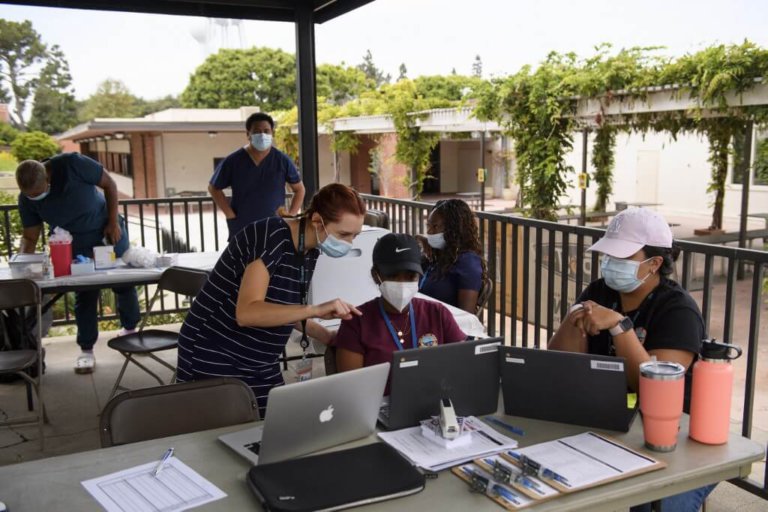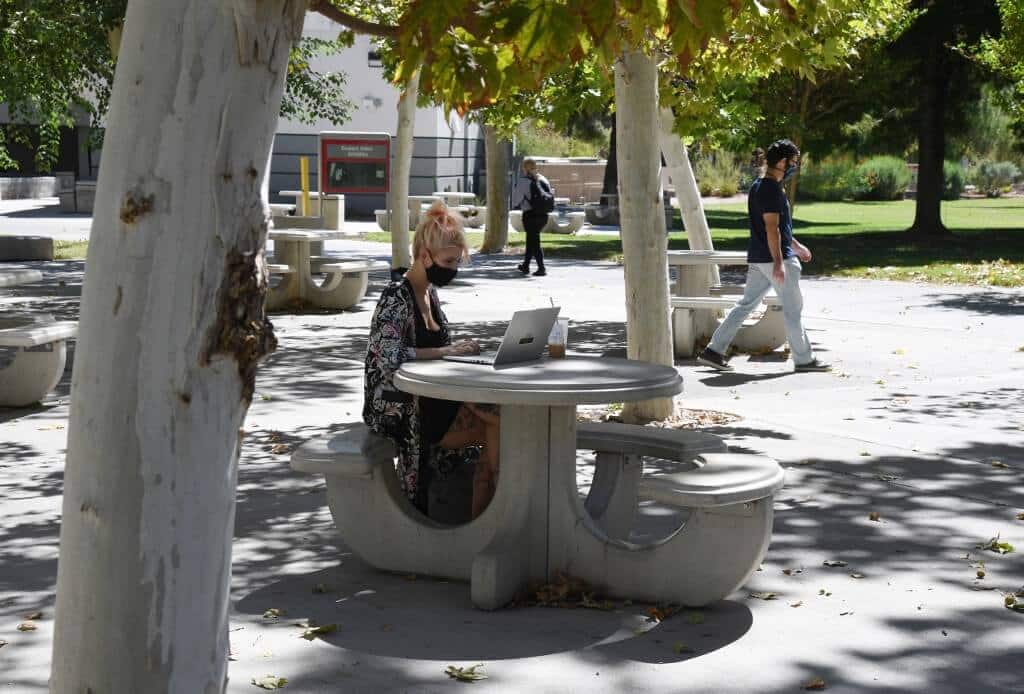
Essays About Personal Growth: Top 5 Examples and 8 Prompts
If you’re writing essays about personal growth, our guide’s article examples and prompts will help stimulate your creative thinking.
Personal growth is looking at ways to improve yourself mentally, socially, spiritually, emotionally or physically. It is a process where we envision a better version of ourselves and strive to realize that ideal self. Personal growth demands the setting of personal goals and ensuring routine progress. The work toward personal development involves a great deal of hard work and discipline as we push our existing skills and strengths to a higher boundary while reducing our underlying weaknesses.
Read our essay examples and prompts below to help you produce a rich and creative essay about personal growth.
5 Essay Examples About Personal Growth
1. is it really too late to learn new skills by margaret talbot, 2. i’ve completed hundreds of 30-day challenges. here’s what i’ve learned by tara nicholle-nelson, 3. i was a self-help guru. here’s why you shouldn’t listen to people like me by michelle goodman, 4. how to craft a personal development plan that inspires meaningful results by scott jeffrey, 5. personal development and the power of feedback by emily marsh, 10 prompts on essays about personal growth, 1. why is personal growth important, 2. take up a personal growth challenge, 3. your personal growth journey, 4. personal growth among successful people, 5. personal growth for leaders , 6. personal growth at work, 7. best personal growth books, 8. strong motivation for achieving personal growth.
| IMAGE | PRODUCT | |
|---|---|---|
| Grammarly | ||
| ProWritingAid |
“… [H]e decides to throw himself into acquiring five new skills. (That’s his term, though I started to think of these skills as “accomplishments” in the way that marriageable Jane Austen heroines have them, talents that make a long evening pass more agreeably, that can turn a person into more engaging company, for herself as much as for others.)
Learning new things may not be a cup of tea for those in their middle ages. To get out of established expertise, be looked down on as a novice, and push the brain to work double time may even be a dreary and intimidating process. , But Journalist Tom Vanderbilt, award-winning writers, and Nobel Prize recipients prove that satisfaction is worth it for personal growth and fulfillment.
“I think of Challenges as self-directed projects to change my behavior or spark some personal growth or development I’m clear that I’d like to have. Sometimes I want a mindset shift or want to make (or break) a habit, or I just have a sort of big project I want to sprint to finish…”
Why are we so drawn to self-imposed challenges? For one, it’s a competition only between you and yourself, giving room for flexibility in the rules you set. It provides structure to your goals, chunks your bigger long-term self-growth goals into gradual and doable daily tasks, provokes a sense of self-accountability, and helps you focus your energy on what matters most.
“Apparently, I learned, gurus are people too, even gurus lining the self-help shelves of friendly neighborhood bookstores. They aren’t infallible, all-knowing oracles above worrying about their generous muffin top or widening backside. They are businesspeople — businesspeople with books, keynotes, and openings in their consulting practice to peddle”
From abhorring gurus to becoming one and then hating the industry much more — this is the story of a self-help book author who realizes it was herself who needed the most advice for personal growth. But, as she creates a facade of a well-balanced life to establish her credibility, things turn dark, almost costing her life.
“When entertainment, distraction, and workaholism consume our attention, something doesn’t feel right within us… To have a full and meaningful life requires us to open to more dimensions of ourselves. And a Personal Development Plan can help us do just that.”
Everyone strives for personal growth. But once we jump at it, some wrong ingredients may spoil the sense of fulfillment we expect. The right process involves navigating your potential, creating a larger vision, selecting areas to focus on, setting your schedule, and monitoring your progress. You might also be interested in these essays about motivation .
“Without feedback, we would learn very little about ourselves, in or out of work. The feedback process is like holding a mirror up to yourself; that’s why it can be uncomfortable at times. You have to be prepared to listen to and acknowledge whatever reveals itself.”
Hearing feedback is critical to personal growth. Negative feedback is constructive in losing our bad habits. However, purely positive feedback is non-progressive and dangerous if we only seek to affirm how we regard ourselves.
We can never be perfect. But we can always progress. In your essay, explain why nurturing a growth mindset in life is essential. What long-term benefits can you reap daily from wanting to be a better person? How does it affect the mind, body, and overall wellness? Answer these while citing studies that outline the essence of personal growth.

Take up any challenge you find exciting and feel up to. Then, write about your experience. If successful, offer tips to your readers on how one can prepare their body, mind, and discipline to stick to the goals. If you did not complete the challenge, don’t worry! Your failure can still be a learning experience that contributes to personal growth and is worth writing about. In addition, you can add what areas of yourself you would like to improve on if you ever take up the challenge again.
Talk about your goals and your daily efforts to reach this goal. It could relate to acing a test, your sports team winning or professional success. Of course, there will be a handful of challenges in any journey toward a goal. What were the obstacles and distractions that tried to keep you off track? Share these with your readers and how you strived or are striving to conquer them.
When you see people already at the height of their careers, you’ll find some continuing to walk out of their comfort zones and reach for the next higher mountain. For this essay, explain the connection between striving for personal growth and success. Then, provide a list of everyday habits among successful people that others could consider adopting.
Leaders must adapt and address problems efficiently and decisively as they move through a fast-changing landscape. Elaborate on how the pursuit of personal growth helps leaders deliver in their enormous role in organizations, companies, and communities.
If you firmly believe that growth at work translates to personal growth, it would be less hard for you to get by at work. But this gets a bit more complex if your feel that your work is no longer satisfying your self-actualization needs and even limiting you. For this prompt, help your readers determine if it’s time to quit their job and continue their journey for personal growth elsewhere. If you want to address companies, offer recommendations enabling their employees to grow and have a vision for themselves. You may also suggest how managers can keep an open line of communication so that personnel can relay their self-development needs.

We all have that book that has given us a new kind of energy that made us feel and believe we can do anything if we put our heart into it. We keep these books close to our hearts, serving as a reminder of other bigger goals ahead of us when the going gets tough. Create a numbered list of the books that have captivated you and helped you realize your potential. Talk about the best quotes that struck the chord and the thought racing in your mind while reading them.
When you tap onto your inherent and external motivation for a much-needed push, it may be easier to turn bad moments into something that helps advance personal development plans. For your essay, explain how motivation can be a bridge to get you to your growth goals.
If you’re still stuck, check out our general resource of essay writing topics .
For help with this topic, read our guide explaining what is persuasive writing ?
- [email protected]
- (650) 338-8226
Cupertino, CA

- Our Philosophy
- Our Results
- News, Media, and Press
- Common Application
- College Application Essay Editing
- Extracurricular Planning
- Academic Guidance
- Summer Programs
- Interview Preparation
Middle School
- Pre-High School Consultation
- Boarding School Admissions
College Admissions
- Academic and Extracurricular Profile Evaluation
- Senior Editor College Application Program
- Summer Program Applications
- Private Consulting Program
- Transfer Admissions
- UC Transfer Admissions
- Ivy League Transfer Admissions
Graduate Admissions
- Graduate School Admissions
- MBA Admissions
Private Tutoring
- SAT/ACT Tutoring
- AP Exam Tutoring
- Olympiad Training
Research Programs
- Science Research Program
- Humanities Competitions
- Passion Project Program
- Ad Hoc Consulting
- Athletic Recruitment
- National Universities Rankings
- Liberal Arts Colleges Rankings
- Public Schools Rankings
Acceptance Rates
- University Acceptance Rates
- Transfer Acceptance Rates
- Supplemental Essays
- College Admissions Data
- Chances Calculator
- GPA Calculator
National Universities
- College Acceptance Rates
- College Overall Acceptance Rates
- College Regular Acceptance Rates
- College Early Acceptance Rates
- Ivy League Acceptance Rates
- Ivy League Overall Acceptance Rates
- Ivy League Regular Acceptance Rates
- Ivy League Early Acceptance Rates
Public Schools
- Public Schools Acceptance Rates
- Public Schools Overall Acceptance Rates
- Public Schools Regular Acceptance Rates
- Public Schools Early Acceptance Rates
Liberal Arts
- Liberal Arts Colleges Acceptance Rates
- Liberal Arts Colleges Overall Acceptance Rates
- Liberal Arts Colleges Regular Acceptance Rates
- Liberal Arts Colleges Early Acceptance Rates

How to Write a Personal Growth Essay

By Eric Eng

How to Write a Personal Growth Essay
In the world of academic admissions, the personal growth essay stands as a monumental pillar where potential meets opportunity. It is here that students get the chance to showcase not just their academic prowess, but also their journey of self-discovery, growth, and the lessons that have shaped them into who they are today.
For students ready to weave their narrative into a compelling personal growth essay, this blog post seeks to be the guiding light that illuminates the path to success. Here, we delve deep into the crafting process, giving you tips to construct an essay that is both genuine and impactful.
What is a personal growth essay?
In the realm of college admissions, the personal growth essay serves as a formidable tool to express character, experiences, and personal evolution. This isn’t merely a timeline of events; rather, it charts the intricate journey of change, realizations, and discoveries that leave a significant mark on one’s life.
The Essence of a Personal Growth Essay
Central to the personal growth essay is the emphasis on the transformative journey of an individual. It’s not just a compilation of events or a simple chronological tale. This essay highlights your understanding, maturity, and moments of self-discovery. It narrates how experiences, both monumental and subtle, mold perspectives and guide future decisions.

Diving into the Aspects of Personal Growth
Overcoming Personal Challenges:
Life brims with tests of our strength and character. You might have grappled with personal insecurities, academic hurdles, or physical challenges. Discussing these in your essay isn’t merely about describing them. It’s about illustrating resilience, determination, and the tactics you employed to conquer them, giving readers an insight into your character’s depth and resilience.
Embracing New Skills or Hobbies:
Opting to delve into something unfamiliar, whether it’s a sport, musical instrument, or craft, often ushers in both challenges and rewards. Through this, your character layers are enriched by countless hours of practice, moments of frustration, and the exhilaration of finally mastering the skill. This journey showcases your curiosity, commitment, and incessant drive to evolve.
Shifting Personal Beliefs or Values:
Throughout your life, encounters with diverse cultures, people, and experiences might have reshaped previously held beliefs or values. Writing about this transformation can highlight your adaptability, open-mindedness, and maturity to embrace diverse viewpoints.
Gaining Insight from Memorable Experiences:
Life offers moments, be they during travel, community service, or a profound conversation, that trigger deep realizations. These epiphanies can recalibrate life goals, ambitions, and viewpoints. When you discuss such an experience, focus on its subsequent impact on your life.
Reflection as the Backbone of Your Essay
The reflection component is paramount in the personal growth essay. Merely narrating events isn’t sufficient; diving into their deeper implications is crucial. Consider asking yourself:
- What insights did the experience offer?
- How did it recalibrate your perspective on life or relationships?
- What emotions did you navigate during this phase?
- How have you integrated lessons from this episode into other facets of your life?
Your reflective thoughts highlight your analytical prowess, introspection, and profound comprehension. It’s these reflections that breathe authenticity into your narrative, allowing it to connect genuinely with readers.
In summation, the personal growth essay is a profound exploration—a journey of self-realization, maturity, and evolution. By emphasizing not just events, but their ripple effects, you can craft an essay that captures your journey and deeply engages readers.
Why is it important?
In the competitive realm of college applications, your essay serves as a beacon, showcasing your unique experiences, traits, and aspirations.
Among various essay topics, personal growth remains an illuminating choice. Why should you opt for this theme? Let’s delve into its unmatched importance.
1. The Universal Appeal of Growth
Everyone, regardless of background or age, undergoes personal growth. This universal theme ensures your essay resonates with many.
The Impact of Relatability:
Admissions officers don’t just seek a well-written essay; they yearn for a connection. By sharing your transformative experiences, you build a bond with the reader, tapping into shared human experiences.
A Broad Spectrum of Experiences:
Growth provides a wide canvas. It can encompass a range of experiences, from tackling challenges to significant self-discoveries, allowing you to mold the theme to reflect your unique path.
2. Demonstrating Resilience: The Story Behind Your Growth
Growth often emerges from confronting challenges, making errors, and bouncing back stronger. Such narratives showcase your adaptability and resilience—qualities universities admire.
The Importance of Resilience:
The dynamic college environment demands adaptability. By showcasing your resilience, you assure universities of your capability to handle diverse challenges.
Analyzing Your Growth:
Universities appreciate understanding how you achieve your growth. Did you proactively seek help? Did you reflect and pinpoint areas for self-improvement? Your approach to growth demonstrates your proactive nature and self-awareness.
3. Depth Beyond Grades
While academic achievements remain pivotal, they provide a limited view of an applicant. Universities seek multifaceted individuals, ready to become tomorrow’s leaders and innovators.
Showcasing Your Depth:
While grades reveal your academic competence, personal growth essays delve into your emotional intelligence, passion, and empathy. This perspective offers a comprehensive insight into the experiences that have molded your aspirations.
Charting Your Evolution:
Detailing your growth milestones illustrates your commitment to personal development. It’s an opportunity to highlight your journey, allowing universities to understand the individual behind the grades.
In conclusion, while numerous essay topics are available, focusing on personal growth presents a distinctive blend of universal appeal, resilience, and depth. Such an essay transcends academic achievements, offering a holistic view of your journey and readiness for the future. This perspective could be the distinguishing factor in your college application , setting you apart in the admissions process.

Crafting the Perfect Personal Growth Essay
Your personal growth essay stands out as a unique window into your soul, illustrating your journey, the challenges you’ve faced, and how you’ve transformed. How do you ensure your essay distinguishes itself among thousands? Dive into the art of crafting a compelling narrative about personal growth.
1. Choose Your Story: The Heartbeat of Your Essay
The essence of your essay lies in the story you decide to narrate. Growth can sprout from myriad experiences, both grand and ordinary.
Moments that Matter:
Your initial thought might be to highlight a significant event or milestone. Yet, often, what may seem like simple moments—a conversation, a book, or a fleeting thought—can leave lasting impacts. The focus should be on how deeply the experience changed you.
A Tapestry of Emotions:
Ensure your story covers a spectrum of emotions, from challenges and setbacks to triumphs and revelations, making your narrative both engaging and relatable.
2. Engage the Reader: Begin with a Bang
Your essay’s opening lines are pivotal. They can either draw in or push away the reader.
Imagery and Description:
Use vivid imagery and sensory details to immerse the reader in your world. Allow them to experience your journey firsthand.
Anecdotal Approach:
Initiate your essay with a brief, related anecdote, that serves as a captivating hook.
3. Deep Reflection: Delve Beyond the Surface
After narrating your experience, it’s essential to reflect on its significance.
Show, Don’t Just Tell:
Instead of merely stating your growth, use examples. Highlight how you’ve evolved over time.
4. Authenticity: Let Your True Self Shine Through
In your eagerness to impress, don’t lose your genuine voice or overstate events.
Unfiltered Truth:
Share your story, with all its vulnerabilities and imperfections. Authentic narratives, filled with genuine emotions, resonate most.
Consistency in Voice:
Your writing should sound like you. While articulation is crucial, avoid sounding overly formal or academic.
5. Review and Revise: Refine Your Narrative
After writing down your draft, approach it critically, refining it as needed.
External Perspectives:
Even though your narrative is personal, feedback from mentors, peers, or teachers can offer invaluable insights.
Grammar and Structure:
Ensure flawless grammar and a logical flow in your essay. This not only demonstrates your attention to detail but also makes your piece more engaging.
An essay on personal growth paints a picture of your experiences, reflections, and growth. By weaving your story with authenticity, depth, and clarity, you create a narrative that not only resonates but also stands as a testament to your transformative journey.
Common Pitfalls to Avoid
Your essay on personal growth stands as a testament to introspection, reflection, and transformation. Like all writing, potential pitfalls can diminish its power. Here’s how you can recognize and avoid these traps:

1. The Power of Detail: Avoiding Vagueness
Broad statements might sound deep, but often they lack depth and relatability.
Paint a Picture:
Instead of stating that you learned resilience, dive deep. Did you face numerous rejections before securing an internship? Did a subject challenge you until you mastered it? Specifics enhance authenticity and paint a clearer picture, letting your readers connect with your journey.
Make Your Story Unique:
Incorporate anecdotes, emotions, and observations. This touch makes your essay stand out and remain in memory.
2. Embracing the Full Spectrum: Not Just the Negative
Challenges drive growth, but they’re only part of the story. Focusing only on them overshadows the positive outcomes of the experience.
Spot the Silver Linings:
After detailing challenges, turn your attention to the lessons you gleaned, the skills you honed, and the positive shifts that occurred. This balance demonstrates resilience and the ability to find optimism during tough times.
Cherish Every Step:
Each growth moment, big or small, matters. Celebrate your increased self-awareness, moments of determination, and times of revelation.
3. More than Just a List: Showcasing Depth
Your essay isn’t merely an extension of your achievements. It’s a space to reveal the passion and struggle behind those accomplishments.
Detail the Journey:
An achievement marks a growth milestone, but the path, with its challenges and revelations, holds the true value.
Look Beyond Accolades:
Focus on the emotional and psychological growth layers, elements often hidden in the simple lists of a resume.
4. The Essence of Reflection: Go Beyond the Surface
Reflection is essential. An essay without it might seem shallow.
Probe Deeper into Your Experiences:
After sharing events, consider their impact. How did they influence you? Why did they matter? What did you uncover about yourself?
Chart Your Evolution:
Illustrate your transformation, highlighting shifts in perspective, values, or dreams.
To wrap up, writing about personal growth is an introspective journey. By navigating around these pitfalls, you ensure a narrative that’s impactful and a testament to your development.
Connecting Your Personal Growth Essay to College Admissions
For many students, navigating the college admissions process feels daunting. Each component demands precision and attention. Particularly, essays on personal growth provide a unique opportunity to display one’s development as an individual.
How can you strategically align this essay with your college aspirations? Let’s explore.
Demonstrating Fit: Aligning Your Journey with Academic Goals
Every student possesses a unique story. Where your journey intersects with academic ambitions, you can craft a compelling narrative for admissions committees.
Connecting the Dots:
Did a specific event deepen your interest in a particular field? By drawing a clear link between your experiences and your chosen major, you can show genuine passion and dedication. For example, if a robotics competition honed your problem-solving abilities and heightened your engineering interest, such a discussion would appeal to an engineering program.
Showcasing Alignment:
Though the journey is crucial, it’s also vital to demonstrate how it resonates with your desired college’s ethos, values, or curriculum. This alignment suggests to admissions committees not just that you’re an excellent student, but that you’re a perfect fit for their institution.

Distinguishing Yourself: The Unique Impact of Your Journey
With a sea of applicants boasting notable academic and extracurricular achievements, your essay on personal development can be the distinguishing factor.
The Power of Perspective:
Two students might share similar experiences, but their insights, reflections, and developments can be vastly different. Your unique viewpoint and depth of introspection can set your essay apart.
Narrating Uncharted Paths:
Some growth experiences are unconventional. Embracing and articulating these journeys can spotlight your individuality and determination.
Highlighting Soft Skills: Unveiling the Hidden Side of You
While academic excellence is vital, universities are increasingly valuing soft skills, as they often predict adaptability and success in various settings.
The Canvas of Growth:
Use your essay as a platform to highlight skills such as resilience, empathy, leadership, or conflict resolution. For instance, if you bridged cultural gaps during a study abroad experience, it underscores your adaptability and open-mindedness.
Balancing Act:
When detailing these skills, ensure your narrative doesn’t sound boastful. Focus on the journey, letting soft skills emerge naturally from your story.
An essay on personal growth isn’t just about individual development. It’s a strategic piece of your college application. By connecting your story to academic goals, showcasing unique viewpoints, and highlighting soft skills, you can craft a powerful narrative that emphasizes your suitability and worth as a prospective student.
As you approach the admissions process, having expert guidance can be invaluable. AdmissionSight specializes in helping students position themselves in the best possible light for college admissions. Their expertise can assist you in refining your personal growth essay, ensuring it aligns with your overall application narrative, and increasing your chances of being admitted to your dream college.
Remember, the college admissions journey is not just about showcasing your academic prowess, but sharing your unique story and growth. With the right guidance and a compelling personal growth essay, your dream college is within reach.
Want to assess your chances of admission? Take our FREE chances calculator today!

Why College Admissions Isn’t Perfect

US News Rankings

The Personal Statement: The Holy Grail of College Admissions

The Modern Day 4.0 and 1600 SAT Score Student Is No Longer Impressive

The Competitive Nature of College Admissions for Asian Americans

The College Application

Our Comprehensive Approach

Ivy League Schools

How Early Should You Prepare for College?

Featured in US News & World Report Best Colleges Publication

Congratulations to AdmissionSight Students and their Acceptances!

College Rejection

College Rankings

College Consultants Could Make A Difference

College Admissions Scandal and Higher Education

Top Extracurricular Activities for Ivy Leagues

Where is Boston University Located?

Top 10 Undergraduate Business Programs

Where is Claremont McKenna Located?

Ivy League Rankings 2024

10 Humanities Programs for High School Students

Where is Georgia Tech located?

How to Qualify for National Merit Semifinalist 2025

Where Is Harvey Mudd Located?

Where is the University of Virginia located?

Where is Wake Forest located?

Where is the University of Michigan located?

How to Update Caltech After Submitting Your Application

How to Update Yale After Submitting Your Application

What Are the Score Choice Policies at Top 50 Universities?
How to update mit after submitting your application.

Where is Carnegie Mellon University located?
Leave a comment cancel reply.
Your email address will not be published. Required fields are marked *
Save my name, email, and website in this browser for the next time I comment.
Recent Articles

Top Extracurricular Activities for Ivy...

10 Humanities Programs for High...

How to Qualify for National...

Where is the University of...

Sign up now to receive insights on how to navigate the college admissions process.

Admissions Counseling
- Academic & Extracurricular Profile Evaluation
Copyright © AdmissionSight 2024
Privacy Policy - Terms and Conditions
Tips for Writing an Essay on an Event That Led to Personal Growth
Tips and Strategies for an Essay on an Event that Led to Personal Growth
Jay Reilly/Getty Images
- Essay Samples & Tips
- College Admissions Process
- College Profiles
- College Rankings
- Choosing A College
- Application Tips
- Testing Graphs
- College Financial Aid
- Advanced Placement
- Homework Help
- Private School
- College Life
- Graduate School
- Business School
- Distance Learning
- Ph.D., English, University of Pennsylvania
- M.A., English, University of Pennsylvania
- B.S., Materials Science & Engineering and Literature, MIT
For the 2019-20 admissions cycle, the fifth essay option on the Common Application focuses on "personal growth":
Discuss an accomplishment, event, or realization that sparked a period of personal growth and a new understanding of yourself or others.
We all have all had experiences that bring about growth and maturity, so essay option five will be a viable choice for all applicants. The big challenges with this essay prompt will be identifying the correct "accomplishment, event, or realization" and then making sure the discussion of your growth has enough depth and self-analysis to show that you are a strong and thoughtful college applicant. The tips below can help guide you as you tackle essay option five:
What Defines a "Period of Personal Growth"?
The heart of this essay prompt is the idea of "personal growth." It's a remarkably broad concept, and as a result this essay prompt gives you the freedom to talk about almost anything meaningful that has ever happened to you. Your job with this essay prompt is to identify a moment that is meaningful and that provides the admissions folks with a window into your interests and personality.
As you work to define an appropriate "period of personal growth," reflect on the last several years of your life. You shouldn't go back more than a few years since the admissions folks are trying to learn about who you are now and how you process and grow from the experiences in your life. A story from your early childhood won't accomplish this goal as well as a more recent event. As you reflect, try to identify moments that made you rethink your assumptions and worldview. Identify an event that has made you a more mature person who is now better prepared for the responsibilities and independence of college. These are the moments that can lead to an effective essay.
What Type of "Accomplishment, Event, or Realization" Is Best?
As you brainstorm ideas for this essay prompt, think broadly as you try to come up with a good choice for the "accomplishment, event, or realization." The best choices, of course, will be significant moments in your life. You want to introduce the admissions folks to something you value highly. Also keep in mind that these three words—accomplishment, event, realization—are interconnected. Both accomplishments and realizations stem from something that happened in your life; in other words, without some kind of event, you're unlikely to accomplish something meaningful or have a realization that leads to personal growth.
We can still break down the three terms as we explore options for the essay, but keep in mind that your options include, but are not limited to:
- You reach a goal that you have set for yourself such as earning a certain GPA or performing a difficult piece of music.
- You do something independently for the first time such as preparing a meal for the family, flying across the country, or house-sitting for a neighbor.
- You overcome or learn to appreciate a disability or handicap.
- Working alone or with a team, you win an award or recognition (a gold medal in a music competition, a strong showing in Odyssey of the Mind, a successful fundraising campaign, etc.)
- You successfully launch your own business (a lawn-mowing service, babysitting business, web company, etc.)
- You successfully navigate or extricate yourself from a dangerous or challenging situation (an abusive family, a problematic peer group, etc.)
- You do something challenging like winter camping, white-water kayaking, or running a marathon.
- You complete a meaningful service project such as creating a public garden or helping build a house with Habitat for Humanity.
- You pass a milestone in your life such as the first day of high school or your first time driving by yourself.
- You have an interaction with someone (whether that be a friend, family member or stranger) that opens your awareness in a profound way.
- You perform at an event such as a concert or competition in which your hard work and perseverance finally pay off.
- You experience a traumatic event such as an accident or sudden loss that makes you reevaluate your behavior or beliefs.
- You experience a moment of failure (much like option #2 ) that causes you to grapple with and grow from the experience.
- You are moved by a world event that makes you reflect upon what you most value and what your role in the world might be.
- You realize that you can accomplish something you hadn't thought possible.
- You realize your limitations.
- You realize that failure is as valuable as success.
- You realize that your understanding of people who are different than you had been limited or faulty.
- You experience something that makes you realize that you need to redefine your priorities.
- You realize that relying on the help of others isn't a failure.
- You come to understand how much a parent or mentor has to teach you.
Personal Growth Can Stem From Failure
Keep in mind that the "accomplishment, event, or realization" doesn't have to be a triumphant moment in your life. An accomplishment can be learning to deal with setbacks or failure, and the event could be a losing game or an embarrassing solo in which you missed that high C. Part of maturing is learning to accept our own shortcomings, and recognizing that failure is both inevitable and an opportunity to learn.
Most Important of All: "Discuss"
When you "discuss" your event or accomplishment, make sure you push yourself to think analytically. Don't spend too much time merely describing and summarizing the event or accomplishment. A strong essay needs to show off your ability to explore the significance of the event you have chosen. You need to look inward and analyze how and why the event caused you to grow and mature. When the prompt mentions "a new understanding," it is telling you that this is an exercise in self-reflection. If the essay doesn't reveal some solid self-analysis, then you haven't fully succeeded in responding to the prompt.
A Final Note for Common Application Option #5
Try to step back from your essay and ask yourself exactly what information it conveys to your reader. What will your reader learn about you? Does the essay succeed in revealing something that you care about deeply? Does it get at a central aspect of your personality? Remember, the application is asking for an essay because the college has holistic admissions —the school is evaluating you as a whole person, not as a bunch of test scores and grades. They essay, then, needs to paint a portrait of an applicant the school will want to invite to join the campus community. In your essay, do you come across as an intelligent, thoughtful person who will contribute to the community in a meaningful and positive way?
No matter which essay prompt you choose, pay attention to style , tone, and mechanics. The essay is first and foremost about you, but it also needs to demonstrate a strong writing ability. These 5 tips for a winning essay can also help guide you.
Finally, realize that many topics fit under multiple options on the Common Application. For example, option #3 asks about questioning or challenging a belief or idea. This can certainly connect with the idea of a "realization" in option #5. Also, option #2 on encountering obstacles could also overlap with some of the possibilities for option #5. Don't worry too much about which option is best if your topic fits in multiple places. Most important is that you write an effective and engaging essay. Be sure to check out this article for tips and samples for each of the Common Application essay options .
- The 2021-22 Common Application Essay Prompts
- 4 Teaching Philosophy Statement Examples
- Common Application Essay Option 2 Tips: Learning from Failure
- Sample Common Application Essay for Option #5
- Common Application Essay Option 4—Gratitude
- Common Application Essay on a Meaningful Place
- Tips for an Application Essay on a Significant Experience
- Common Application Essay Option 3 Tips: Challenging a Belief
- 2020-21 Common Application Essay Option 4—Solving a Problem
- "Gym Class Hero" - a Common Application Essay Sample for Option #3
- A Sample Essay for Common Application Option #7: Topic of Your Choice
- Sample College Admissions Essay - Student Teacher
- Tips for the Pre-2013 Personal Essay Options on the Common Application
- Common Application Essay, Option 1: Share Your Story
- Topic of Your Choice: Common Application Essay Tips
- "Handiwork" - Sample Common Application Essay for Option #1

Presentations made painless
- Get Premium
Personal Growth Essay Examples & Samples
- Transcendentalism Essay Examples & Samples
- Letter to My Future Self Examples & Samples
- Literacy Narrative Essay Examples & Samples
- Rhetorical Analysis Examples & Samples
- 3 Page Essay Examples & Samples
- College and University Essay Examples
- 500 Words Essay Examples 2024
- 250 Words Essay Examples 2024
- Psychology Essay Examples 2024: Best Samples
- Essay About Culture: Best Samples and Examples
- Essay About Social Media: Best Samples and Examples
- 200 Words Essay Examples 2024
- Essay About Climate Change: Best Samples and Examples
- Long Essay Examples 2024: Best Samples
- 1500 Words Essay Examples 2024: Best Samples
- 2000 Words Essay Examples 2024: Best Samples
- Essay About Economics: Best Samples and Examples
- 3000 Words Essay Examples 2024: Best Samples
- School Essay Examples and Samples
- Essay About Self-analysis: Best Samples and Examples
- 600 Words Essay Examples 2024: Best Samples
- 400 Words Essay Examples 2024: Best Samples
- 300 Words Essay Examples 2024: Best Samples
- Essay About Stress: Best Samples and Examples
- 100 Words Essay Examples 2024: Best Samples
- 800 Words Essay Examples 2024
- Essay About Japan: Best Samples and Examples
- Essay About Sport: Best Samples and Examples
- Essay About Healthcare: Best Samples and Examples
- Essay About Influence: Best Samples and Examples
- Essay About Marketing: Best Samples and Examples
- 2500 Words Essay Examples 2024: Best Samples
- Essay About Privacy: Best Samples and Examples
- Essay About Ecology: Best Samples and Examples
- 450 Words Essay Examples 2024: Best Samples
- Application Letter Examples and Samples 2024
- Personal Statement Examples and Samples
- Admission Essay Examples and Samples
- Scholarship Essay Examples and Samples
- Statement of Purpose Examples and Samples
- Resume Examples and Samples
- Job Application Letter Examples and Samples
- Business Letter Examples and Samples
- Cover Letter Examples and Samples
- Business Plan Proposal Examples and Samples 2024
- Press-release Examples and Samples
- Meeting Minutes Examples and Samples
- Business Email Examples and Samples
- Meeting Agenda Examples and Samples
- Progress Report Examples and Samples
- Brochure Examples and Samples
- Newsletter Examples and Samples
- White Paper Examples and Samples
- Business Report Examples and Samples
- Business Proposal Examples and Samples
- Business Presentation Examples and Samples
- Recommendation Letter Examples and Samples
- Reference Letter Samples
- Grant Application Examples and Samples
- Hardship Letter Examples and Samples
- Reconsideration Letter Examples and Samples
- Fundraising Letter Examples and Samples
- Complaint Letter Examples and Samples
- Informal Letter Examples and Samples
- Resignation Letter Samples
- Complimentary Letter Examples and Samples
- Refund Letter Examples and Samples
- University Deferral Letter Examples and Samples 2024
- Evaluation Letter Examples and Samples
- Poem Examples and Samples
- Article Examples and Samples
- Short Story Examples and Samples
- Travelogue Examples and Samples
- Interview Examples and Samples
- Haiku Examples and Samples
- Autobiography Examples and Samples
- Screenplay Examples and Samples
- Novel Examples and Samples
- Memoir Examples and Samples
- Song Examples and Samples
- Creative Book Examples
- Essentials of Writing Samples
- Examples of Grammar Handbook
- Writing Process Samples
- Transitions Samples
- Negative Words Samples
- Author Quotes About Writing 2024
- Supporting Evidence Examples and Samples 2024
- Examples of Grammar Mistakes
- Brainstorming Samples
- First Draft Examples and Samples 2024
- Outlining Examples and Samples 2024
- Second Draft Samples
- Thesis Statement Samples
- Final Draft Examples and Samples 2024
- Editing Samples
- Research Samples
- Samples of Introducing Sources
- Review Examples and Samples
- Research Paper Examples and Samples 2024
- Annotated Bibliography Examples and Samples
- Term Paper Examples and Samples
- Speech Examples and Samples
- Coursework Examples and Samples
- Academic Essay Examples and Samples
- Process Paper Examples and Samples
- Case Study Examples and Samples
- Presentation Examples and Samples 2024
- Lab Report Examples and Samples
- Article Review Examples and Samples
- Book Review Examples and Samples
- Film&Movie Review Examples and Samples
- Poetry Analysis Examples and Samples
- Play Review Examples and Samples
- Song&Music Review Examples and Samples
- Research Proposal Examples and Samples
- Capstone Project Examples and Samples
- General Research Examples and Samples
- Thesis Statement Examples and Samples
- Dissertation&Thesis Examples and Samples
- Critical Essay Examples and Samples
- Descriptive Essay Examples and Samples 2024
- Compare and Contrast Essay Examples and Samples
- Narrative Essay Examples and Samples
- Best Persuasive Essay Examples
- Expository Essay Examples and Samples
- Cause and Effect Essay Examples and Samples 2024
- Definition Essay Examples and Samples
- Reflective Essay Examples and Samples
- Analytical Essay Examples and Samples 2024
- Summary Essay Examples and Samples
- Evaluation Essay Examples and Samples
- Argumentative Essay Examples and Samples
- NHS Essay Examples and Samples
- Discourse Community Essay Examples
- Essay on Synthesis Examples, Samples
- Essay on Racism Examples and Samples
- Essay on Gun Violence Examples and Samples
- Essay on Mental Health Examples and Samples
- Essay on Nursing Examples and Samples
- Essay on Gun Control Examples and Samples
- Essay on Education Examples and Samples
- Essay on Who Am I Examples and Samples
- Essay on Bullying Examples and Samples
- Essay on Artificial Intelligence Examples and Samples
- Essay on Music Examples and Samples
- Essay on Problem Solution Examples and Samples
- Essay on Integrity Examples and Samples
- Essay on Leadership Examples and Samples
- Essay on Domestic Violence Examples and Samples
- Essay on Respect Examples and Samples
- Essay on Profile Examples and Samples
- Essay on Life Examples and Samples
- Essay on Autobiographical Examples and Samples
- Essay on Obesity Examples and Samples
- Essay on Cyberbullying Examples and Samples
- Essay on Technology Examples and Samples
- Essay on Professionalism Examples and Samples
- Essay on Career Goals Examples and Samples
- Essay on Animal Testing Examples and Samples
- Essay on Drug Abuse Examples and Samples
- Essay on Immigrations Examples and Samples
- Essay on Capital Punishment Examples and Samples
- Essay on Communication Examples and Samples
- Essay on Friendship Examples and Samples
- Essay on Community Service Examples and Samples
- Essay on My Family Examples and Samples
- Essay on Frankenstein Examples and Samples
- Essay on Pro Life Examples and Samples
- Essay on Anxiety Examples and Samples
- Essay on Industrial Revolution Examples and Samples
- Essay on Research Argument Examples and Samples
- Essay on Food Examples and Samples
- Essay on Great Depression Examples and Samples
- Essay on Self-Reflection Examples and Samples
- Essay on The Great Gatsby Examples and Samples
- Essay On What Does It Mean to Be American Examples and Samples
- Essay on World War 2 Examples and Samples
- Essay on Ethics Examples and Samples
- Essay on Concert Review Examples and Samples
- Essay on Fahrenheit 451 Examples and Samples
- Essay on Nursing Scholarship Examples and Samples
- Essay on Pro Choice Examples and Samples
- Essay on Process Analysis Examples and Samples
- Essay on Solar Energy Examples and Samples
- Essay on Personal Narrative Examples and Samples
- Essay on Hamlet Examples and Samples
- Essay on Civil Rights Examples and Samples
- Essay on Rhetoric Examples and Samples
- Essay on Martin Luther King Examples and Samples
Recent Articles

Oct 19 2023
Lifelong Learning Personal Statement Sample

Oct 17 2023
Passion Projects Personal Statement Example

Oct 05 2023
Individual Growth Personal Statement Sample
Jul 17 2013
How Positive Thinking Affects Personality Essay Sample, Example
Dec 26 2012
The Success of a Romantic Relationship: Why Individual Growth Matters Essay Sample, Example
Remember Me
What is your profession ? Student Teacher Writer Other
Forgotten Password?
Username or Email
Personal Growth Essays
Empowering journeys: the benefits of solo female travel, the townsend version of the ant and the grasshopper, integrative relationship approach: integrating the humanistic and psychodynamic approaches, navigating stress: strategies for coping and personal growth, reflections on ethical development in the field of alcohol and substance abuse counseling, self-coaching: enhancing personal growth through self-reflection and positive thinking, the curious incident of the dog in the night-time., the transformative journey of home: from jumeirah 1 to nad al sheba 4 and al barsha 3, the three key benefits of earning a college degree, the psychology of your future self, men’s health – wa2, a journey of hope: finding my home in the usa, reflective exploration of personal growth in change leadership: navigating educational transformations for future impact, the application and reflection on counseling techniques: enhancing proficiency and personal growth, enhancing professional and personal growth through virtue: three scenarios for be the best you, popular essay topics.
- American Dream
- Artificial Intelligence
- Black Lives Matter
- Bullying Essay
- Career Goals Essay
- Causes of the Civil War
- Child Abusing
- Civil Rights Movement
- Community Service
- Cultural Identity
- Cyber Bullying
- Death Penalty
- Depression Essay
- Domestic Violence
- Freedom of Speech
- Global Warming
- Gun Control
- Human Trafficking
- I Believe Essay
- Immigration
- Importance of Education
- Israel and Palestine Conflict
- Leadership Essay
- Legalizing Marijuanas
- Mental Health
- National Honor Society
- Police Brutality
- Pollution Essay
- Racism Essay
- Romeo and Juliet
- Same Sex Marriages
- Social Media
- The Great Gatsby
- The Yellow Wallpaper
- Time Management
- To Kill a Mockingbird
- Violent Video Games
- What Makes You Unique
- Why I Want to Be a Nurse
- Send us an e-mail
- Admission Essay
- Statement of Purpose Editing
- Personal Statement Editing
- Recommendation Letter
- Motivation Letter
- Cover Letter
- Supplemental Essay
- Letter of Continued Interest
- Scholarship Essay
- Role Model Essay
- Our Editors
- College Admission Essay Examples
- College Cover Letter Examples
- College Personal Statement Examples
- Graduate Personal Statement Examples
- Graduate Statement of Purpose Examples
- MBA Essay Examples
- MBA Personal Statement Examples
- MBA Resume Examples
- MBA Recommendation Letter Examples
- Medical School Personal Statement Examples
- Medical School Recommendation Letter Examples
- Pricing Plans
- Public Health
- Dissertation
- Research Paper
- Thesis Editing
- Academic Editing
- Motivation letter
- Letter of Recommendation
- Personal Statement
- Statement of Purpose
Personal Growth Essay | A Winning Essay Writing Strategy
EssayEdge > Blog > Personal Growth Essay | A Winning Essay Writing Strategy
Personal Growth. Perhaps this topic is the most popular one since it delves into the heart of what the admissions essay is all about: helping the college gain better insight into an applicant’s personality and character. Some schools ask targeted questions — “What was the most challenging event you have ever faced, and how have you grown from it?” — while others leave the topic open: “Describe an event that has had great meaning for you. Explain why and how it has affected you.”
One of the most successful strategies is to use a past event as a lens through which you can assess who you were and the person you became, how you have grown and changed, your transformation. Most children are curious, but were you the one who asked your teacher what caused the change of seasons of the year and then created a solar system model and explained the concept to your classmates? Though you may think that your topic needs to be more grandiose, that is not necessary for an essay to be effective. Instead, success lies in painting an accurate and vivid picture of yourself — one that will show admissions officers that you have much to offer their school.

The most important advice we can give is to be honest, refrain from using clichés, and show maturity. College represents a radical change from high school, so you want your reader to realize that you are more than ready to take the next major step in your life.
Sample Essays And Comments
- Well Done Personal Growth Essay
- Poorly Done Personal Growth Essay
Next: Accomplishments
Need help? Check out EssayEdge editing services:
Popular Posts
June 2, 2022 How To Start a Scholarship Essay: Catch Reader’s Attention Fast
May 16, 2022 My Role Model Essay: A Few Ways to Elaborate on The Subject
May 3, 2022 How To Start a Personal Statement? | Writing Tips and Samples
Related Posts
July 14, 2021 Personal Statement Sample: How Can It Help You With Writing?
June 3, 2021 Clichés in College Essay Examples: How To Recognize Them?
October 26, 2020 Alternative Medicine Application Essay Sample – Edited
©2024 Student Media LLC. All rights reserved.
EssayEdge: Essay Editing & Proofreading Service.
Our mission is to prepare you for academic and career success.
- Log In
- Sign Up
- Forgot password
Unable to log in? Please clear your browser's cache and then refresh this page and try again
Reset password Please enter your email address to request a password reset.

Check your email We’ve just sent a password reset link to your email.
This information is used to create your account
6 ways to writing an empowering personal growth essay

Did you know that personal growth essays are a common and popular prompt during college applications?
Like other essay prompts such as “ learning from obstacles ”, college admission essays are meant to help the college gain better insight into your character and personality.
A winning essay should be personal — one which showcases your uniqueness.
Some schools ask targeted questions like “What was the most challenging event you have ever faced, and how have you grown from it?”.
Or a more open-ended one like “Describe an event that has had great meaning for you. Explain why and how it has affected you.”
Knowing how to craft a strong essay can increase your admissions chances by ten times, according to a case study done on Harvard’s admission rates.
What’s more, college essays play a significant role in determining whether or not your application receives a second look or gets tossed aside.
Hence, knowing how to craft an impactful essay can make a world of a difference:
Here’s how to write a winning personal growth essay:
Elements of a good personal growth essay.

College admission essays are meant to help the college gain better insight into your character and personality. Source: Ina Fassbender/AFP
There are four main components of an excellent personal growth essay.
Apart from having zero spelling and grammar mistakes, it’s also essential to have an engaging narrative, convincing argumentation, a well-organised structure and relevant information.
Your essay should also emphasise your motivations, strengths, and accomplishments that make you the ideal candidate.
If you are confused as to what you just read, remember the following when writing your essay:
- Craft a compelling narrative that highlights your experience and capabilities. A successful introduction usually begins with a story, anecdote, or personal experience.
- A well-organised structure consists of at least three to four paragraphs, excluding the introduction and conclusion.
- Place relevant information regarding your accomplishments and strengths.
- Like any other essay, conclude with an “answer” that is direct to the question posed and avoid adding new information.
6 steps to writing the best personal growth essay

Craft the best personal growth essay with these six steps. Source: Ethan Miller/Getty Images North America/Getty Images via AFP
The standard format for these types of essays consists of three primary components: an introduction paragraph, a primary body composed of two to four paragraphs, and a conclusion paragraph.
1. Create an outline
Creating an outline helps you determine the overall tone of the piece. A framework lets you lay out the main points you want to include.
These points can include a valuable lesson that had a personal impact on how you live your life.
2. Write a strong introduction
Think of your introduction as a “hook” to reel your readers in to make a solid first impression. A weak hook gives the impression that your content is dull.
Immediately give the reader an idea of what they can expect from the rest of the piece by explaining the topic from the get-go. This will encourage them to continue reading.
3. Crafting an impactful story with emotions
In the body paragraph, you flesh out what you’ve mentioned in the introduction.
When developing the body of your essay, keep your thesis statement in mind and build around it.
To keep your readers interested throughout your personal growth essay, you have to gradually take them on a visual journey across your essential points.
4. Be direct
One of the most important points when writing your essay is being concise and direct. It can be tempting to input extra information to hit the word count, but we don’t recommend that.
Remember, the essay’s purpose is to talk about a significant moment in your life. So, it’s essential that you get to the point quickly with ample details.
5. Conclude
Your conclusion should summarise and highlight the key takeaway from your essay.
6. Double-, triple-check for errors
Even the most famous writers proofread their work.
Since this personal growth essay is for your college application, paying attention to detail when reading your piece before submitting it can go a long way.
An excellent way to do this is by reading out loud; this helps highlight any errors you may have missed.
Apart from checking for grammar and spelling, check if your main message is conveyed accurately. Proofreading helps ensure that the narrative flows in the manner that you desire.
Popular stories
Barack obama, natalie portman, neil degrasse tyson, and more: famous harvard graduates you might not expect.

10 most difficult words to spell that even professors fail at

These gorgeous university libraries are about to blow your mind

Go behind the screen: The gaming careers for those who don’t want to be professional players

10 tips on how to write a winning scholarship essay

5 tips on how to nail your college application essay

Should you use a bot to write your essays?
What are your chances of acceptance?
Calculate for all schools, your chance of acceptance.
Your chancing factors
Extracurriculars.
10 Personal Statement Essay Examples That Worked
What’s covered:, what is a personal statement.
- Essay 1: Summer Program
- Essay 2: Being Bangladeshi-American
- Essay 3: Why Medicine
- Essay 4: Love of Writing
- Essay 5: Starting a Fire
- Essay 6: Dedicating a Track
- Essay 7: Body Image and Eating Disorders
- Essay 8: Becoming a Coach
- Essay 9: Eritrea
- Essay 10: Journaling
- Is Your Personal Statement Strong Enough?
Your personal statement is any essay that you must write for your main application, such as the Common App Essay , University of California Essays , or Coalition Application Essay . This type of essay focuses on your unique experiences, ideas, or beliefs that may not be discussed throughout the rest of your application. This essay should be an opportunity for the admissions officers to get to know you better and give them a glimpse into who you really are.
In this post, we will share 10 different personal statements that were all written by real students. We will also provide commentary on what each essay did well and where there is room for improvement, so you can make your personal statement as strong as possible!
Please note: Looking at examples of real essays students have submitted to colleges can be very beneficial to get inspiration for your essays. You should never copy or plagiarize from these examples when writing your own essays. Colleges can tell when an essay isn’t genuine and will not view students favorably if they plagiarized.
Personal Statement Examples
Essay example #1: exchange program.
The twisting roads, ornate mosaics, and fragrant scent of freshly ground spices had been so foreign at first. Now in my fifth week of the SNYI-L summer exchange program in Morocco, I felt more comfortable in the city. With a bag full of pastries from the market, I navigated to a bus stop, paid the fare, and began the trip back to my host family’s house. It was hard to believe that only a few years earlier my mom was worried about letting me travel around my home city on my own, let alone a place that I had only lived in for a few weeks. While I had been on a journey towards self-sufficiency and independence for a few years now, it was Morocco that pushed me to become the confident, self-reflective person that I am today.
As a child, my parents pressured me to achieve perfect grades, master my swim strokes, and discover interesting hobbies like playing the oboe and learning to pick locks. I felt compelled to live my life according to their wishes. Of course, this pressure was not a wholly negative factor in my life –– you might even call it support. However, the constant presence of my parents’ hopes for me overcame my own sense of desire and led me to become quite dependent on them. I pushed myself to get straight A’s, complied with years of oboe lessons, and dutifully attended hours of swim practice after school. Despite all these achievements, I felt like I had no sense of self beyond my drive for success. I had always been expected to succeed on the path they had defined. However, this path was interrupted seven years after my parents’ divorce when my dad moved across the country to Oregon.
I missed my dad’s close presence, but I loved my new sense of freedom. My parents’ separation allowed me the space to explore my own strengths and interests as each of them became individually busier. As early as middle school, I was riding the light rail train by myself, reading maps to get myself home, and applying to special academic programs without urging from my parents. Even as I took more initiatives on my own, my parents both continued to see me as somewhat immature. All of that changed three years ago, when I applied and was accepted to the SNYI-L summer exchange program in Morocco. I would be studying Arabic and learning my way around the city of Marrakesh. Although I think my parents were a little surprised when I told them my news, the addition of a fully-funded scholarship convinced them to let me go.
I lived with a host family in Marrakesh and learned that they, too, had high expectations for me. I didn’t know a word of Arabic, and although my host parents and one brother spoke good English, they knew I was there to learn. If I messed up, they patiently corrected me but refused to let me fall into the easy pattern of speaking English just as I did at home. Just as I had when I was younger, I felt pressured and stressed about meeting their expectations. However, one day, as I strolled through the bustling market square after successfully bargaining with one of the street vendors, I realized my mistake. My host family wasn’t being unfair by making me fumble through Arabic. I had applied for this trip, and I had committed to the intensive language study. My host family’s rules about speaking Arabic at home had not been to fulfill their expectations for me, but to help me fulfill my expectations for myself. Similarly, the pressure my parents had put on me as a child had come out of love and their hopes for me, not out of a desire to crush my individuality.
As my bus drove through the still-bustling market square and past the medieval Ben-Youssef madrasa, I realized that becoming independent was a process, not an event. I thought that my parents’ separation when I was ten had been the one experience that would transform me into a self-motivated and autonomous person. It did, but that didn’t mean that I didn’t still have room to grow. Now, although I am even more self-sufficient than I was three years ago, I try to approach every experience with the expectation that it will change me. It’s still difficult, but I understand that just because growth can be uncomfortable doesn’t mean it’s not important.
What the Essay Did Well
This is a nice essay because it delves into particular character trait of the student and how it has been shaped and matured over time. Although it doesn’t focus the essay around a specific anecdote, the essay is still successful because it is centered around this student’s independence. This is a nice approach for a personal statement: highlight a particular trait of yours and explore how it has grown with you.
The ideas in this essay are universal to growing up—living up to parents’ expectations, yearning for freedom, and coming to terms with reality—but it feels unique to the student because of the inclusion of details specific to them. Including their oboe lessons, the experience of riding the light rail by themselves, and the negotiations with a street vendor helps show the reader what these common tropes of growing up looked like for them personally.
Another strength of the essay is the level of self-reflection included throughout the piece. Since there is no central anecdote tying everything together, an essay about a character trait is only successful when you deeply reflect on how you felt, where you made mistakes, and how that trait impacts your life. The author includes reflection in sentences like “ I felt like I had no sense of self beyond my drive for success, ” and “ I understand that just because growth can be uncomfortable doesn’t mean it’s not important. ” These sentences help us see how the student was impacted and what their point of view is.
What Could Be Improved
The largest change this essay would benefit from is to show not tell. The platitude you have heard a million times no doubt, but for good reason. This essay heavily relies on telling the reader what occurred, making us less engaged as the entire reading experience feels more passive. If the student had shown us what happens though, it keeps the reader tied to the action and makes them feel like they are there with the student, making it much more enjoyable to read.
For example, they tell us about the pressure to succeed their parents placed on them: “ I pushed myself to get straight A’s, complied with years of oboe lessons, and dutifully attended hours of swim practice after school.” They could have shown us what that pressure looked like with a sentence like this: “ My stomach turned somersaults as my rattling knee thumped against the desk before every test, scared to get anything less than a 95. For five years the painful squawk of the oboe only reminded me of my parents’ claps and whistles at my concerts. I mastered the butterfly, backstroke, and freestyle, fighting against the anchor of their expectations threatening to pull me down.”
If the student had gone through their essay and applied this exercise of bringing more detail and colorful language to sentences that tell the reader what happened, the essay would be really great.
Table of Contents
Essay Example #2: Being Bangladeshi-American
Life before was good: verdant forests, sumptuous curries, and a devoted family.
Then, my family abandoned our comfortable life in Bangladesh for a chance at the American dream in Los Angeles. Within our first year, my father was diagnosed with thyroid cancer. He lost his battle three weeks before my sixth birthday. Facing a new country without the steady presence of my father, we were vulnerable — prisoners of hardship in the land of the free. We resettled in the Bronx, in my uncle’s renovated basement. It was meant to be our refuge, but I felt more displaced than ever. Gone were the high-rise condos of West L.A.; instead, government projects towered over the neighborhood. Pedestrians no longer smiled and greeted me; the atmosphere was hostile, even toxic. Schoolkids were quick to pick on those they saw as weak or foreign, hurling harsh words I’d never heard before.
Meanwhile, my family began integrating into the local Bangladeshi community. I struggled to understand those who shared my heritage. Bangladeshi mothers stayed home while fathers drove cabs and sold fruit by the roadside — painful societal positions. Riding on crosstown buses or walking home from school, I began to internalize these disparities. During my fleeting encounters with affluent Upper East Siders, I saw kids my age with nannies, parents who wore suits to work, and luxurious apartments with spectacular views. Most took cabs to their destinations: cabs that Bangladeshis drove. I watched the mundane moments of their lives with longing, aching to plant myself in their shoes. Shame prickled down my spine. I distanced myself from my heritage, rejecting the traditional panjabis worn on Eid and refusing the torkari we ate for dinner every day.
As I grappled with my relationship with the Bangladeshi community, I turned my attention to helping my Bronx community by pursuing an internship with Assemblyman Luis Sepulveda. I handled desk work and took calls, spending the bulk of my time actively listening to the hardships constituents faced — everything from a veteran stripped of his benefits to a grandmother unable to support her bedridden grandchild.
I’d never exposed myself to stories like these, and now I was the first to hear them. As an intern, I could only assist in what felt like the small ways — pointing out local job offerings, printing information on free ESL classes, reaching out to non-profits. But to a community facing an onslaught of intense struggles, I realized that something as small as these actions could have vast impacts. Seeing the immediate consequences of my actions inspired me. Throughout that summer, I internalized my community’s daily challenges in a new light. I began to stop seeing the prevalent underemployment and cramped living quarters less as sources of shame. Instead, I saw them as realities that had to be acknowledged, but could ultimately be remedied. I also realized the benefits of the Bangladeshi culture I had been so ashamed of. My Bangla language skills were an asset to the office, and my understanding of Bangladeshi etiquette allowed for smooth communication between office staff and its constituents. As I helped my neighbors navigate city services, I saw my heritage with pride — a perspective I never expected to have.
I can now appreciate the value of my unique culture and background, and of living with less. This perspective offers room for progress, community integration, and a future worth fighting for. My time with Assemblyman Sepulveda’s office taught me that I can be a change agent in enabling this progression. Far from being ashamed of my community, I want to someday return to local politics in the Bronx to continue helping others access the American Dream. I hope to help my community appreciate the opportunity to make progress together. By embracing reality, I learned to live it. Along the way, I discovered one thing: life is good, but we can make it better.
This student’s passion for social justice and civic duty shines through in this essay because of how honest it is. Sharing their personal experience with immigrating, moving around, being an outsider, and finding a community allows us to see the hardships this student has faced and builds empathy towards their situation. However, what really makes it strong is that they go beyond describing the difficulties they faced and explain the mental impact it had on them as a child: Shame prickled down my spine. I distanced myself from my heritage, rejecting the traditional panjabis worn on Eid and refusing the torkari we ate for dinner every day.
The rejection of their culture presented at the beginning of the essay creates a nice juxtaposition with the student’s view in the latter half of the essay and helps demonstrate how they have matured. They use their experience interning as a way to delve into a change in their thought process about their culture and show how their passion for social justice began. Using this experience as a mechanism to explore their thoughts and feelings is an excellent example of how items that are included elsewhere on your application should be incorporated into your essay.
This essay prioritizes emotions and personal views over specific anecdotes. Although there are details and certain moments incorporated throughout to emphasize the author’s points, the main focus remains on the student and how they grapple with their culture and identity.
One area for improvement is the conclusion. Although the forward-looking approach is a nice way to end an essay focused on social justice, it would be nice to include more details and imagery in the conclusion. How does the student want to help their community? What government position do they see themselves holding one day?
A more impactful ending might look like the student walking into their office at the New York City Housing Authority in 15 years and looking at the plans to build a new development in the Bronx just blocks away from where the grew up that would provide quality housing to people in their Bangladeshi community. They would smile while thinking about how far they have come from that young kid who used to be ashamed of their culture.
Essay Example #3: Why Medicine
I took my first trip to China to visit my cousin Anna in July of 2014. Distance had kept us apart, but when we were together, we fell into all of our old inside jokes and caught up on each other’s lives. Her sparkling personality and optimistic attitude always brought a smile to my face. This time, however, my heart broke when I saw the effects of her brain cancer; she had suffered from a stroke that paralyzed her left side. She was still herself in many ways, but I could see that the damage to her brain made things difficult for her. I stayed by her every day, providing the support she needed, whether assisting her with eating and drinking, reading to her, or just watching “Friends.” During my flight back home, sorrow and helplessness overwhelmed me. Would I ever see Anna again? Could I have done more to make Anna comfortable? I wished I could stay in China longer to care for her. As I deplaned, I wondered if I could transform my grief to help other children and teenagers in the US who suffered as Anna did.
The day after I got home, as jet lag dragged me awake a few minutes after midnight, I remembered hearing about the Family Reach Foundation (FRF) and its work with children going through treatments at the local hospital and their families. I began volunteering in the FRF’s Children’s Activity Room, where I play with children battling cancer. Volunteering has both made me appreciate my own health and also cherish the new relationships I build with the children and families. We play sports, make figures out of playdoh, and dress up. When they take on the roles of firefighters or fairies, we all get caught up in the game; for that time, they forget the sanitized, stark, impersonal walls of the pediatric oncology ward. Building close relationships with them and seeing them giggle and laugh is so rewarding — I love watching them grow and get better throughout their course of treatment.
Hearing from the parents about their children’s condition and seeing the children recover inspired me to consider medical research. To get started, I enrolled in a summer collegelevel course in Abnormal Psychology. There I worked with Catelyn, a rising college senior, on a data analysis project regarding Dissociative Identity Disorder (DID). Together, we examined the neurological etiology of DID by studying four fMRI and PET cases. I fell in love with gathering data and analyzing the results and was amazed by our final product: several stunning brain images showcasing the areas of hyper and hypoactivity in brains affected by DID. Desire quickly followed my amazement — I want to continue this project and study more brains. Their complexity, delicacy, and importance to every aspect of life fascinate me. Successfully completing this research project gave me a sense of hope; I know I am capable of participating in a large scale research project and potentially making a difference in someone else’s life through my research.
Anna’s diagnosis inspired me to begin volunteering at FRF; from there, I discovered my desire to help people further by contributing to medical research. As my research interest blossomed, I realized that it’s no coincidence that I want to study brains—after all, Anna suffered from brain cancer. Reflecting on these experiences this past year and a half, I see that everything I’ve done is connected. Sadly, a few months after I returned from China, Anna passed away. I am still sad, but as I run a toy truck across the floor and watch one of the little patients’ eyes light up, I imagine that she would be proud of my commitment to pursue medicine and study the brain.
This essay has a very strong emotional core that tugs at the heart strings and makes the reader feel invested. Writing about sickness can be difficult and doesn’t always belong in a personal statement, but in this case it works well because the focus is on how this student cared for her cousin and dealt with the grief and emotions surrounding her condition. Writing about the compassion she showed and the doubts and concerns that filled her mind keeps the focus on the author and her personality.
This continues when she again discusses the activities she did with the kids at FRF and the personal reflection this experience allowed her to have. For example, she writes: Volunteering has both made me appreciate my own health and also cherish the new relationships I build with the children and families. We play sports, make figures out of playdoh, and dress up.
Concluding the essay with the sad story of her cousin’s passing brings the essay full circle and returns to the emotional heart of the piece to once again build a connection with the reader. However, it finishes on a hopeful note and demonstrates how this student has been able to turn a tragic experience into a source of lifelong inspiration.
One thing this essay should be cognizant of is that personal statements should not read as summaries of your extracurricular resume. Although this essay doesn’t fully fall into that trap, it does describe two key extracurriculars the student participated in. However, the inclusion of such a strong emotional core running throughout the essay helps keep the focus on the student and her thoughts and feelings during these activities.
To avoid making this mistake, make sure you have a common thread running through your essay and the extracurriculars provide support to the story you are trying to tell, rather than crafting a story around your activities. And, as this essay does, make sure there is lots of personal reflection and feelings weaved throughout to focus attention to you rather than your extracurriculars.
Essay Example #4: Love of Writing
“I want to be a writer.” This had been my answer to every youthful discussion with the adults in my life about what I would do when I grew up. As early as elementary school, I remember reading my writing pieces aloud to an audience at “Author of the Month” ceremonies. Bearing this goal in mind, and hoping to gain some valuable experience, I signed up for a journalism class during my freshman year. Despite my love for writing, I initially found myself uninterested in the subject and I struggled to enjoy the class. When I thought of writing, I imagined lyrical prose, profound poetry, and thrilling plot lines. Journalism required a laconic style and orderly structure, and I found my teacher’s assignments formulaic and dull. That class shook my confidence as a writer. I was uncertain if I should continue in it for the rest of my high school career.
Despite my misgivings, I decided that I couldn’t make a final decision on whether to quit journalism until I had some experience working for a paper outside of the classroom. The following year, I applied to be a staff reporter on our school newspaper. I hoped this would help me become more self-driven and creative, rather than merely writing articles that my teacher assigned. To my surprise, my time on staff was worlds away from what I experienced in the journalism class. Although I was unaccustomed to working in a fast-paced environment and initially found it burdensome to research and complete high-quality stories in a relatively short amount of time, I also found it exciting. I enjoyed learning more about topics and events on campus that I did not know much about; some of my stories that I covered in my first semester concerned a chess tournament, a food drive, and a Spanish immersion party. I relished in the freedom I had to explore and learn, and to write more independently than I could in a classroom.
Although I enjoyed many aspects of working for the paper immediately, reporting also pushed me outside of my comfort zone. I am a shy person, and speaking with people I did not know intimidated me. During my first interview, I met with the basketball coach to prepare for a story about the team’s winning streak. As I approached his office, I felt everything from my toes to my tongue freeze into a solid block, and I could hardly get out my opening questions. Fortunately, the coach was very kind and helped me through the conversation. Encouraged, I prepared for my next interview with more confidence. After a few weeks of practice, I even started to look forward to interviewing people on campus. That first journalism class may have bored me, but even if journalism in practice was challenging, it was anything but tedious.
Over the course of that year, I grew to love writing for our school newspaper. Reporting made me aware of my surroundings, and made me want to know more about current events on campus and in the town where I grew up. By interacting with people all over campus, I came to understand the breadth of individuals and communities that make up my high school. I felt far more connected to diverse parts of my school through my work as a journalist, and I realized that journalism gave me a window into seeing beyond my own experiences. The style of news writing may be different from what I used to think “writing” meant, but I learned that I can still derive exciting plots from events that may have gone unnoticed if not for my stories. I no longer struggle to approach others, and truly enjoy getting to know people and recognizing their accomplishments through my writing. Becoming a writer may be a difficult path, but it is as rewarding as I hoped when I was young.
This essay is clearly structured in a manner that makes it flow very nicely and contributes to its success. It starts with a quote to draw in the reader and show this student’s life-long passion for writing. Then it addresses the challenges of facing new, unfamiliar territory and how this student overcame it. Finally, it concludes by reflecting on this eye-opening experience and a nod to their younger self from the introduction. Having a well-thought out and sequential structure with clear transitions makes it extremely easy for the reader to follow along and take away the main idea.
Another positive aspect of the essay is the use of strong and expressive language. Sentences like “ When I thought of writing, I imagined lyrical prose, profound poetry, and thrilling plot lines ” stand out because of the intentional use of words like “lyrical”, “profound”, and “thrilling” to convey the student’s love of writing. The author also uses an active voice to capture the readers’ attention and keep us engaged. They rely on their language and diction to reveal details to the reader, for instance saying “ I felt everything from my toes to my tongue freeze into a solid block ” to describe feeling nervous.
This essay is already very strong, so there isn’t much that needs to be changed. One thing that could take the essay from great to outstanding would be to throw in more quotes, internal dialogue, and sensory descriptors.
It would be nice to see the nerves they felt interviewing the coach by including dialogue like “ Um…I want to interview you about…uh…”. They could have shown their original distaste for journalism by narrating the thoughts running through their head. The fast-paced environment of their newspaper could have come to life with descriptions about the clacking of keyboards and the whirl of people running around laying out articles.
Essay Example #5: Starting a Fire
Was I no longer the beloved daughter of nature, whisperer of trees? Knee-high rubber boots, camouflage, bug spray—I wore the garb and perfume of a proud wild woman, yet there I was, hunched over the pathetic pile of stubborn sticks, utterly stumped, on the verge of tears. As a child, I had considered myself a kind of rustic princess, a cradler of spiders and centipedes, who was serenaded by mourning doves and chickadees, who could glide through tick-infested meadows and emerge Lyme-free. I knew the cracks of the earth like the scars on my own rough palms. Yet here I was, ten years later, incapable of performing the most fundamental outdoor task: I could not, for the life of me, start a fire.
Furiously I rubbed the twigs together—rubbed and rubbed until shreds of skin flaked from my fingers. No smoke. The twigs were too young, too sticky-green; I tossed them away with a shower of curses, and began tearing through the underbrush in search of a more flammable collection. My efforts were fruitless. Livid, I bit a rejected twig, determined to prove that the forest had spurned me, offering only young, wet bones that would never burn. But the wood cracked like carrots between my teeth—old, brittle, and bitter. Roaring and nursing my aching palms, I retreated to the tent, where I sulked and awaited the jeers of my family.
Rattling their empty worm cans and reeking of fat fish, my brother and cousins swaggered into the campsite. Immediately, they noticed the minor stick massacre by the fire pit and called to me, their deep voices already sharp with contempt.
“Where’s the fire, Princess Clara?” they taunted. “Having some trouble?” They prodded me with the ends of the chewed branches and, with a few effortless scrapes of wood on rock, sparked a red and roaring flame. My face burned long after I left the fire pit. The camp stank of salmon and shame.
In the tent, I pondered my failure. Was I so dainty? Was I that incapable? I thought of my hands, how calloused and capable they had been, how tender and smooth they had become. It had been years since I’d kneaded mud between my fingers; instead of scaling a white pine, I’d practiced scales on my piano, my hands softening into those of a musician—fleshy and sensitive. And I’d gotten glasses, having grown horrifically nearsighted; long nights of dim lighting and thick books had done this. I couldn’t remember the last time I had lain down on a hill, barefaced, and seen the stars without having to squint. Crawling along the edge of the tent, a spider confirmed my transformation—he disgusted me, and I felt an overwhelming urge to squash him.
Yet, I realized I hadn’t really changed—I had only shifted perspective. I still eagerly explored new worlds, but through poems and prose rather than pastures and puddles. I’d grown to prefer the boom of a bass over that of a bullfrog, learned to coax a different kind of fire from wood, having developed a burn for writing rhymes and scrawling hypotheses.
That night, I stayed up late with my journal and wrote about the spider I had decided not to kill. I had tolerated him just barely, only shrieking when he jumped—it helped to watch him decorate the corners of the tent with his delicate webs, knowing that he couldn’t start fires, either. When the night grew cold and the embers died, my words still smoked—my hands burned from all that scrawling—and even when I fell asleep, the ideas kept sparking—I was on fire, always on fire.
This student is an excellent writer, which allows a simple story to be outstandingly compelling. The author articulates her points beautifully and creatively through her immense use of details and figurative language. Lines like “a rustic princess, a cradler of spiders and centipedes, who was serenaded by mourning doves and chickadees,” and “rubbed and rubbed until shreds of skin flaked from my fingers,” create vivid images that draw the reader in.
The flowery and descriptive prose also contributes to the nice juxtaposition between the old Clara and the new Clara. The latter half of the essay contrasts elements of nature with music and writing to demonstrate how natural these interests are for her now. This sentence perfectly encapsulates the contrast she is trying to build: “It had been years since I’d kneaded mud between my fingers; instead of scaling a white pine, I’d practiced scales on my piano, my hands softening into those of a musician—fleshy and sensitive.”
In addition to being well-written, this essay is thematically cohesive. It begins with the simple introduction “Fire!” and ends with the following image: “When the night grew cold and the embers died, my words still smoked—my hands burned from all that scrawling—and even when I fell asleep, the ideas kept sparking—I was on fire, always on fire.” This full-circle approach leaves readers satisfied and impressed.
There is very little this essay should change, however one thing to be cautious about is having an essay that is overly-descriptive. We know from the essay that this student likes to read and write, and depending on other elements of her application, it might make total sense to have such a flowery and ornate writing style. However, your personal statement needs to reflect your voice as well as your personality. If you would never use language like this in conversation or your writing, don’t put it in your personal statement. Make sure there is a balance between eloquence and your personal voice.
Essay Example #6: Dedicating a Track
“Getting beat is one thing – it’s part of competing – but I want no part in losing.” Coach Rob Stark’s motto never fails to remind me of his encouragement on early-morning bus rides to track meets around the state. I’ve always appreciated the phrase, but an experience last June helped me understand its more profound, universal meaning.
Stark, as we affectionately call him, has coached track at my high school for 25 years. His care, dedication, and emphasis on developing good character has left an enduring impact on me and hundreds of other students. Not only did he help me discover my talent and love for running, but he also taught me the importance of commitment and discipline and to approach every endeavor with the passion and intensity that I bring to running. When I learned a neighboring high school had dedicated their track to a longtime coach, I felt that Stark deserved similar honors.
Our school district’s board of education indicated they would only dedicate our track to Stark if I could demonstrate that he was extraordinary. I took charge and mobilized my teammates to distribute petitions, reach out to alumni, and compile statistics on the many team and individual champions Stark had coached over the years. We received astounding support, collecting almost 3,000 signatures and pages of endorsements from across the community. With help from my teammates, I presented this evidence to the board.
They didn’t bite.
Most members argued that dedicating the track was a low priority. Knowing that we had to act quickly to convince them of its importance, I called a team meeting where we drafted a rebuttal for the next board meeting. To my surprise, they chose me to deliver it. I was far from the best public speaker in the group, and I felt nervous about going before the unsympathetic board again. However, at that second meeting, I discovered that I enjoy articulating and arguing for something that I’m passionate about.
Public speaking resembles a cross country race. Walking to the starting line, you have to trust your training and quell your last minute doubts. When the gun fires, you can’t think too hard about anything; your performance has to be instinctual, natural, even relaxed. At the next board meeting, the podium was my starting line. As I walked up to it, familiar butterflies fluttered in my stomach. Instead of the track stretching out in front of me, I faced the vast audience of teachers, board members, and my teammates. I felt my adrenaline build, and reassured myself: I’ve put in the work, my argument is powerful and sound. As the board president told me to introduce myself, I heard, “runners set” in the back of my mind. She finished speaking, and Bang! The brief silence was the gunshot for me to begin.
The next few minutes blurred together, but when the dust settled, I knew from the board members’ expressions and the audience’s thunderous approval that I had run quite a race. Unfortunately, it wasn’t enough; the board voted down our proposal. I was disappointed, but proud of myself, my team, and our collaboration off the track. We stood up for a cause we believed in, and I overcame my worries about being a leader. Although I discovered that changing the status quo through an elected body can be a painstakingly difficult process and requires perseverance, I learned that I enjoy the challenges this effort offers. Last month, one of the school board members joked that I had become a “regular” – I now often show up to meetings to advocate for a variety of causes, including better environmental practices in cafeterias and safer equipment for athletes.
Just as Stark taught me, I worked passionately to achieve my goal. I may have been beaten when I appealed to the board, but I certainly didn’t lose, and that would have made Stark proud.
This essay effectively conveys this student’s compassion for others, initiative, and determination—all great qualities to exemplify in a personal statement!
Although they rely on telling us a lot of what happened up until the board meeting, the use of running a race (their passion) as a metaphor for public speaking provides a lot of insight into the fear that this student overcame to work towards something bigger than themself. Comparing a podium to the starting line, the audience to the track, and silence to the gunshot is a nice way of demonstrating this student’s passion for cross country running without making that the focus of the story.
The essay does a nice job of coming full circle at the end by explaining what the quote from the beginning meant to them after this experience. Without explicitly saying “ I now know that what Stark actually meant is…” they rely on the strength of their argument above to make it obvious to the reader what it means to get beat but not lose.
One of the biggest areas of improvement in the intro, however, is how the essay tells us Stark’s impact rather than showing us: His care, dedication, and emphasis on developing good character has left an enduring impact on me and hundreds of other students. Not only did he help me discover my talent and love for running, but he also taught me the importance of commitment and discipline and to approach every endeavor with the passion and intensity that I bring to running.
The writer could’ve helped us feel a stronger emotional connection to Stark if they had included examples of Stark’s qualities, rather than explicitly stating them. For example, they could’ve written something like: Stark was the kind of person who would give you gas money if you told him your parents couldn’t afford to pick you up from practice. And he actually did that—several times. At track meets, alumni regularly would come talk to him and tell him how he’d changed their lives. Before Stark, I was ambivalent about running and was on the JV team, but his encouragement motivated me to run longer and harder and eventually make varsity. Because of him, I approach every endeavor with the passion and intensity that I bring to running.
Essay Example #7: Body Image and Eating Disorders
I press the “discover” button on my Instagram app, hoping to find enticing pictures to satisfy my boredom. Scrolling through, I see funny videos and mouth-watering pictures of food. However, one image stops me immediately. A fit teenage girl with a “perfect body” relaxes in a bikini on a beach. Beneath it, I see a slew of flattering comments. I shake with disapproval over the image’s unrealistic quality. However, part of me still wants to have a body like hers so that others will make similar comments to me.
I would like to resolve a silent issue that harms many teenagers and adults: negative self image and low self-esteem in a world where social media shapes how people view each other. When people see the façades others wear to create an “ideal” image, they can develop poor thought patterns rooted in negative self-talk. The constant comparisons to “perfect” others make people feel small. In this new digital age, it is hard to distinguish authentic from artificial representations.
When I was 11, I developed anorexia nervosa. Though I was already thin, I wanted to be skinny like the models that I saw on the magazine covers on the grocery store stands. Little did I know that those models probably also suffered from disorders, and that photoshop erased their flaws. I preferred being underweight to being healthy. No matter how little I ate or how thin I was, I always thought that I was too fat. I became obsessed with the number on the scale and would try to eat the least that I could without my parents urging me to take more. Fortunately, I stopped engaging in anorexic behaviors before middle school. However, my underlying mental habits did not change. The images that had provoked my disorder in the first place were still a constant presence in my life.
By age 15, I was in recovery from anorexia, but suffered from depression. While I used to only compare myself to models, the growth of social media meant I also compared myself to my friends and acquaintances. I felt left out when I saw my friends’ excitement about lake trips they had taken without me. As I scrolled past endless photos of my flawless, thin classmates with hundreds of likes and affirming comments, I felt my jealousy spiral. I wanted to be admired and loved by other people too. However, I felt that I could never be enough. I began to hate the way that I looked, and felt nothing in my life was good enough. I wanted to be called “perfect” and “body goals,” so I tried to only post at certain times of day to maximize my “likes.” When that didn’t work, I started to feel too anxious to post anything at all.
Body image insecurities and social media comparisons affect thousands of people – men, women, children, and adults – every day. I am lucky – after a few months of my destructive social media habits, I came across a video that pointed out the illusory nature of social media; many Instagram posts only show off good things while people hide their flaws. I began going to therapy, and recovered from my depression. To address the problem of self-image and social media, we can all focus on what matters on the inside and not what is on the surface. As an effort to become healthy internally, I started a club at my school to promote clean eating and radiating beauty from within. It has helped me grow in my confidence, and today I’m not afraid to show others my struggles by sharing my experience with eating disorders. Someday, I hope to make this club a national organization to help teenagers and adults across the country. I support the idea of body positivity and embracing difference, not “perfection.” After all, how can we be ourselves if we all look the same?
This essay covers the difficult topics of eating disorders and mental health. If you’re thinking about covering similar topics in your essay, we recommend reading our post Should You Talk About Mental Health in College Essays?
The short answer is that, yes, you can talk about mental health, but it can be risky. If you do go that route, it’s important to focus on what you learned from the experience.
The strength of this essay is the student’s vulnerability, in excerpts such as this: I wanted to be admired and loved by other people too. However, I felt that I could never be enough. I began to hate the way that I looked, and felt nothing in my life was good enough. I wanted to be called “perfect” and “body goals,” so I tried to only post at certain times of day to maximize my “likes.”
The student goes on to share how they recovered from their depression through an eye-opening video and therapy sessions, and they’re now helping others find their self-worth as well. It’s great that this essay looks towards the future and shares the writer’s goals of making their club a national organization; we can see their ambition and compassion.
The main weakness of this essay is that it doesn’t focus enough on their recovery process, which is arguably the most important part. They could’ve told us more about the video they watched or the process of starting their club and the interactions they’ve had with other members. Especially when sharing such a vulnerable topic, there should be vulnerability in the recovery process too. That way, the reader can fully appreciate all that this student has overcome.
Essay Example #8: Becoming a Coach
”Advanced females ages 13 to 14 please proceed to staging with your coaches at this time.” Skittering around the room, eyes wide and pleading, I frantically explained my situation to nearby coaches. The seconds ticked away in my head; every polite refusal increased my desperation.
Despair weighed me down. I sank to my knees as a stream of competitors, coaches, and officials flowed around me. My dojang had no coach, and the tournament rules prohibited me from competing without one.
Although I wanted to remain strong, doubts began to cloud my mind. I could not help wondering: what was the point of perfecting my skills if I would never even compete? The other members of my team, who had found coaches minutes earlier, attempted to comfort me, but I barely heard their words. They couldn’t understand my despair at being left on the outside, and I never wanted them to understand.
Since my first lesson 12 years ago, the members of my dojang have become family. I have watched them grow up, finding my own happiness in theirs. Together, we have honed our kicks, blocks, and strikes. We have pushed one another to aim higher and become better martial artists. Although my dojang had searched for a reliable coach for years, we had not found one. When we attended competitions in the past, my teammates and I had always gotten lucky and found a sympathetic coach. Now, I knew this practice was unsustainable. It would devastate me to see the other members of my dojang in my situation, unable to compete and losing hope as a result. My dojang needed a coach, and I decided it was up to me to find one.
I first approached the adults in the dojang – both instructors and members’ parents. However, these attempts only reacquainted me with polite refusals. Everyone I asked told me they couldn’t devote multiple weekends per year to competitions. I soon realized that I would have become the coach myself.
At first, the inner workings of tournaments were a mystery to me. To prepare myself for success as a coach, I spent the next year as an official and took coaching classes on the side. I learned everything from motivational strategies to technical, behind-the-scenes components of Taekwondo competitions. Though I emerged with new knowledge and confidence in my capabilities, others did not share this faith.
Parents threw me disbelieving looks when they learned that their children’s coach was only a child herself. My self-confidence was my armor, deflecting their surly glances. Every armor is penetrable, however, and as the relentless barrage of doubts pounded my resilience, it began to wear down. I grew unsure of my own abilities.
Despite the attack, I refused to give up. When I saw the shining eyes of the youngest students preparing for their first competition, I knew I couldn’t let them down. To quit would be to set them up to be barred from competing like I was. The knowledge that I could solve my dojang’s longtime problem motivated me to overcome my apprehension.
Now that my dojang flourishes at competitions, the attacks on me have weakened, but not ended. I may never win the approval of every parent; at times, I am still tormented by doubts, but I find solace in the fact that members of my dojang now only worry about competing to the best of their abilities.
Now, as I arrive at a tournament with my students, I close my eyes and remember the past. I visualize the frantic search for a coach and the chaos amongst my teammates as we competed with one another to find coaches before the staging calls for our respective divisions. I open my eyes to the exact opposite scene. Lacking a coach hurt my ability to compete, but I am proud to know that no member of my dojang will have to face that problem again.
This essay begins with an in-the-moment narrative that really illustrates the chaos of looking for a coach last-minute. We feel the writer’s emotions, particularly her dejectedness, at not being able to compete. Starting an essay in media res is a great way to capture the attention of your readers and build anticipation for what comes next.
Through this essay, we can see how gutsy and determined the student is in deciding to become a coach themselves. She shows us these characteristics through their actions, rather than explicitly telling us: To prepare myself for success as a coach, I spent the next year as an official and took coaching classes on the side. Also, by discussing the opposition she faced and how it affected her, the student is open and vulnerable about the reality of the situation.
The essay comes full circle as the author recalls the frantic situations in seeking out a coach, but this is no longer a concern for them and their team. Overall, this essay is extremely effective in painting this student as mature, bold, and compassionate.
The biggest thing this essay needs to work on is showing not telling. Throughout the essay, the student tells us that she “emerged with new knowledge and confidence,” she “grew unsure of her own abilities,” and she “refused to give up”. What we really want to know is what this looks like.
Instead of saying she “emerged with new knowledge and confidence” she should have shared how she taught a new move to a fellow team-member without hesitation. Rather than telling us she “grew unsure of her own abilities” she should have shown what that looked like by including her internal dialogue and rhetorical questions that ran through her mind. She could have demonstrated what “refusing to give up” looks like by explaining how she kept learning coaching techniques on her own, turned to a mentor for advice, or devised a plan to win over the trust of parents.
Essay Example #9: Eritrea
No one knows where Eritrea is.
On the first day of school, for the past nine years, I would pensively stand in front of a class, a teacher, a stranger waiting for the inevitable question: Where are you from?
I smile politely, my dimples accentuating my ambiguous features. “Eritrea,” I answer promptly and proudly. But I am always prepared. Before their expression can deepen into confusion, ready to ask “where is that,” I elaborate, perhaps with a fleeting hint of exasperation, “East Africa, near Ethiopia.”
Sometimes, I single out the key-shaped hermit nation on a map, stunning teachers who have “never had a student from there!” Grinning, I resist the urge to remark, “You didn’t even know it existed until two minutes ago!”
Eritrea is to the East of Ethiopia, its arid coastline clutches the lucrative Red Sea. Battle scars litter the ancient streets – the colonial Italian architecture lathered with bullet holes, the mosques mangled with mortar shells. Originally part of the world’s first Christian kingdom, Eritrea passed through the hands of colonial Italy, Britain, and Ethiopia for over a century, until a bloody thirty year war of Independence liberated us.
But these are facts that anyone can know with a quick Google search. These are facts that I have memorised and compounded, first from my Grandmother and now from pristine books borrowed from the library.
No historical narrative, however, can adequately capture what Eritrea is. No one knows the aroma of bushels of potatoes, tomatoes, and garlic – still covered in dirt – that leads you to the open-air market. No one knows the poignant scent of spices, arranged in orange piles reminiscent of compacted dunes. No one knows how to haggle stubborn herders for sheep and roosters for Christmas celebrations as deliberately as my mother. No one can replicate the perfect balance of spices in dorho and tsebhi as well as my grandmother, her gnarly hands stirring the pot with ancient precision (chastising my clumsy knife work with the potatoes). It’s impossible to learn when the injera is ready – the exact moment you have to lift the lid of the mogogo. Do it too early (or too late) and the flatbread becomes mangled and gross. It is a sixth sense passed through matriarchal lineages.
There are no sources that catalogue the scent of incense that wafts through the sunlit porch on St. Michael’s; no films that can capture the luminescence of hundreds of flaming bonfires that fluoresce the sidewalks on Kudus Yohannes, as excited children chant Ge’ez proverbs whose origin has been lost to time. You cannot learn the familiarity of walking beneath the towering Gothic figure of the Enda Mariam Cathedral, the crowds undulating to the ringing of the archaic bells. I have memorized the sound of the rains hounding the metal roof during kiremti , the heat of the sun pounding against the Toyota’s window as we sped down towards Ghinda , the opulent brilliance of the stars twinkling in a sky untainted by light pollution, the scent of warm rolls of bani wafting through the streets at precisely 6 o’clock each day…
I fill my flimsy sketchbook with pictures from my memory. My hand remembers the shapes of the hibiscus drifting in the wind, the outline of my grandmother (affectionately nicknamed a’abaye ) leaning over the garden, the bizarre architecture of the Fiat Tagliero . I dice the vegetables with movements handed down from generations. My nose remembers the scent of frying garlic, the sourness of the warm tayta , the sharpness of the mit’mt’a …
This knowledge is intrinsic. “I am Eritrean,” I repeat. “I am proud.” Within me is an encyclopedia of history, culture, and idealism.
Eritrea is the coffee made from scratch, the spices drying in the sun, the priests and nuns. Eritrea is wise, filled with ambition, and unseen potential. Eritrea isn’t a place, it’s an identity.
This is an exceptional essay that provides a window into this student’s culture that really makes their love for their country and heritage leap off the page. The sheer level of details and sensory descriptors this student is able to fit in this space makes the essay stand out. From the smells, to the traditions, sounds, and sights, the author encapsulates all the glory of Eritrea for the reader.
The vivid images this student is able to create for the reader, whether it is having the tedious conversation with every teacher or cooking in their grandmother’s kitchen, transports us into the story and makes us feel like we are there in the moment with the student. This is a prime example of an essay that shows , not tells.
Besides the amazing imagery, the use of shorter paragraphs also contributes to how engaging this essay is. Employing this tactic helps break up the text to make it more readable and it isolates ideas so they stick out more than if they were enveloped in a large paragraph.
Overall, this is a really strong essay that brings to life this student’s heritage through its use of vivid imagery. This essay exemplifies what it means to show not tell in your writing, and it is a great example of how you can write an intimate personal statement without making yourself the primary focus of your essay.
There is very little this essay should improve upon, but one thing the student might consider would be to inject more personal reflection into their response. Although we can clearly take away their deep love and passion for their homeland and culture, the essay would be a bit more personal if they included the emotions and feelings they associate with the various aspects of Eritrea. For example, the way their heart swells with pride when their grandmother praises their ability to cook a flatbread or the feeling of serenity when they hear the bells ring out from the cathedral. Including personal details as well as sensory ones would create a wonderful balance of imagery and reflection.
Essay Example #10: Journaling
Flipping past dozens of colorful entries in my journal, I arrive at the final blank sheet. I press my pen lightly to the page, barely scratching its surface to create a series of loops stringing together into sentences. Emotions spill out, and with their release, I feel lightness in my chest. The stream of thoughts slows as I reach the bottom of the page, and I gently close the cover of the worn book: another journal finished.
I add the journal to the stack of eleven books on my nightstand. Struck by the bittersweet sensation of closing a chapter of my life, I grab the notebook at the bottom of the pile to reminisce.
“I want to make a flying mushen to fly in space and your in it” – October 2008
Pulling back the cover of my first Tinkerbell-themed diary, the prompt “My Hopes and Dreams” captures my attention. Though “machine” is misspelled in my scribbled response, I see the beginnings of my past obsession with outer space. At the age of five, I tore through novels about the solar system, experimented with rockets built from plastic straws, and rented Space Shuttle films from Blockbuster to satisfy my curiosities. While I chased down answers to questions as limitless as the universe, I fell in love with learning. Eight journals later, the same relentless curiosity brought me to an airplane descending on San Francisco Bay.
“I wish I had infinite sunsets” – July 2019
I reach for the charcoal notepad near the top of the pile and open to the first page: my flight to the Stanford Pre-Collegiate Summer Institutes. While I was excited to explore bioengineering, anxiety twisted in my stomach as I imagined my destination, unsure of whether I could overcome my shyness and connect with others.
With each new conversation, the sweat on my palms became less noticeable, and I met students from 23 different countries. Many of the moments where I challenged myself socially revolved around the third story deck of the Jerry house. A strange medley of English, Arabic, and Mandarin filled the summer air as my friends and I gathered there every evening, and dialogues at sunset soon became moments of bliss. In our conversations about cultural differences, the possibility of an afterlife, and the plausibility of far-fetched conspiracy theories, I learned to voice my opinion. As I was introduced to different viewpoints, these moments challenged my understanding of the world around me. In my final entries from California, I find excitement to learn from others and increased confidence, a tool that would later allow me to impact my community.
“The beauty in a tower of cans” – June 2020
Returning my gaze to the stack of journals, I stretch to take the floral-patterned book sitting on top. I flip through, eventually finding the beginnings of the organization I created during the outbreak of COVID-19. Since then, Door-to-Door Deliveries has woven its way through my entries and into reality, allowing me to aid high-risk populations through free grocery delivery.
With the confidence I gained the summer before, I took action when seeing others in need rather than letting my shyness hold me back. I reached out to local churches and senior centers to spread word of our services and interacted with customers through our website and social media pages. To further expand our impact, we held two food drives, and I mustered the courage to ask for donations door-to-door. In a tower of canned donations, I saw the value of reaching out to help others and realized my own potential to impact the world around me.
I delicately close the journal in my hands, smiling softly as the memories reappear, one after another. Reaching under my bed, I pull out a fresh notebook and open to its first sheet. I lightly press my pen to the page, “And so begins the next chapter…”
The structuring of this essay makes it easy and enjoyable to read. The student effectively organizes their various life experiences around their tower of journals, which centers the reader and makes the different stories easy to follow. Additionally, the student engages quotes from their journals—and unique formatting of the quotes—to signal that they are moving in time and show us which memory we should follow them to.
Thematically, the student uses the idea of shyness to connect the different memories they draw out of their journals. As the student describes their experiences overcoming shyness at the Stanford Pre-Collegiate Summer Institutes and Door-to-Door Deliveries, this essay can be read as an Overcoming Obstacles essay.
At the end of this essay, readers are fully convinced that this student is dedicated (they have committed to journaling every day), thoughtful (journaling is a thoughtful process and, in the essay, the student reflects thoughtfully on the past), and motivated (they flew across the country for a summer program and started a business). These are definitely qualities admissions officers are looking for in applicants!
Although this essay is already exceptionally strong as it’s written, the first journal entry feels out of place compared to the other two entries that discuss the author’s shyness and determination. It works well for the essay to have an entry from when the student was younger to add some humor (with misspelled words) and nostalgia, but if the student had either connected the quote they chose to the idea of overcoming a fear present in the other two anecdotes or if they had picked a different quote all together related to their shyness, it would have made the entire essay feel more cohesive.
Where to Get Your Personal Statement Edited
Do you want feedback on your personal statement? After rereading your essays countless times, it can be difficult to evaluate your writing objectively. That’s why we created our free Peer Essay Review tool , where you can get a free review of your essay from another student. You can also improve your own writing skills by reviewing other students’ essays.
If you want a college admissions expert to review your essay, advisors on CollegeVine have helped students refine their writing and submit successful applications to top schools. Find the right advisor for you to improve your chances of getting into your dream school!
Next Step: Supplemental Essays
Essay Guides for Each School
How to Write a Stellar Extracurricular Activity College Essay
4 Tips for Writing a Diversity College Essay
How to Write the “Why This College” Essay
Related CollegeVine Blog Posts

101 Personal Growth Examples

Chris Drew (PhD)
Dr. Chris Drew is the founder of the Helpful Professor. He holds a PhD in education and has published over 20 articles in scholarly journals. He is the former editor of the Journal of Learning Development in Higher Education. [Image Descriptor: Photo of Chris]
Learn about our Editorial Process

Personal growth is the process in which an individual recognizes and maximizes their own potential.
For instance, a person may seek to improve their communication skills (a facet of personal growth) by participating in public speaking workshops over a period of time.
Personal growth is a continuous and lifelong process, often marked by periods of rapid personal development followed by periods of slower growth, much like the physical growth from infancy to adulthood (Johnson & Swanson, 2016).
The personal growth process entails the development and enhancement of various aspects of life, including but not limited to:
- Career Growth: Career growth pertains to the progression and advancement in one’s professional life. It entails acquiring new skills, achieving high performance in current roles, and moving upward in professional responsibilities (Ng, Eby, Sorensen, & Feldman, 2010). An example of career growth could be a junior software developer who hones their coding expertise over time, eventually leading a team of developers. Career growth is not just about upward mobility; it’s about doing work that is fulfilling, challenging, and aligned with personal interests and values.
- Intellectual Growth: Intellectual growth involves the expansion of knowledge, critical thinking abilities, and cognitive skills . It can occur formally through education or informally through self-directed learning and reasoned experience (Ramsden, 2015). For example, you might take online courses on philosophy, triggering deeper questioning and critical examination of life’s profound questions.
- Emotional Growth: Emotional growth refers to the maturation of emotional responses and the strengthening of emotional intelligence (Brackett, Rivers, & Salovey, 2011). A person growing emotionally might learn how to manage anger more effectively or become better at expressing feelings in a healthy manner. Emotional growth fosters better interpersonal relationships, self-awareness, and psychological resilience.
- Moral Growth : Moral growth signifies the development of your ethical understanding, values, and behavior (Nucci, 2014). It includes the cultivation of virtues such as honesty, integrity, and empathy. For instance, an individual might reflect on an unfair action they have taken and decide to apologize and rectify the mistake, demonstrating moral growth. By refining our moral compass, you may enhance your sense of justice, empathy, and social responsibility.
Personal Growth Examples
1. Cultivating a Growth Mindset : When you cultivate a growth mindset, you’re building the inner belief that your abilities and intelligence can be developed over time (Dweck, 2010). Embracing such a mindset provides a pathway for maximum self-improvement . It also promotes lifelong learning , with the recognition that you can always improve and become a better you. This means embracing the thought, “I can’t do it…yet,” rather than “I can’t do it.”
2. Developing Leadership Skills : Leadership skills can include the ability to guide, inspire, and influence others toward achieving a common goal (Van Vugt, Hogan, & Kaiser, 2008). They might be important indicators of personal growth if you’re going for a promotion. These skills include abilities like decision-making, communication, delegating tasks, and fostering team spirit.
3. Engaging in Volunteer Work: Volunteering allows you to contribute to your communities while fostering empathy and understanding (Wilson, 2012). Doing volunteer work, such as serving food in a soup kitchen, can allow you to connect with diverse backgrounds, widens their perspective, and therefore nourish your empathy and social conscience.
4. Nurtiring Self-Compassion: Self-compassion involves acknowledging your own shortcomings and treating yourself with kindness despite failures (Neff, 2011). Instead of harsh self-criticism, self-compassion offers a balanced approach to dealing with personal flaws and failures. For instance, if you fail at a job interview, self-compassion would entail understanding that failure is part of human experience and does not reflect your overall worth. This, obviously, is good for your mental health.
5. Overcoming Fears: Fear often deters us from exploring our full capabilities (Öhman, 2008). Overcoming fears means confronting what scares us, be it fear of heights, public speaking, or failure. Overcoming fear is a telltale sign of personal growth To overcome fear, you might intentionally and gradually expose yourself to the fearful situation in a process called systematic desensitization . For example, someone afraid of heights might start by climbing a short ladder, then moving to a two-story building, and so forth. Such bravery encourages psychological resilience and enables exploration of unknown territories, hence fostering personal growth.
6. Improving Time Management: If you’re trying to demonstrate personal growth to an employer, this one’s perfect. When done successfully, time management enhances productivity, mitigates stress, and unveils avenues for growth – all things your employer loves to see. An example of improved time management could be an individual employing a systematized daily planner or a digital application. This system aids in organizing tasks, creates reminders for deadlines, and consequently opens up time for self-development, relaxation, and recreation.
7. Adopting Healthy Habits: Healthy habits can totally change your life, leading to huge personal growth (Lippke, Nigg, & Maddock, 2012). They may help you lose weight, sleep better, have more energy, wake earlier, and so on. For instance, an individual might opt to consume five servings of fruits and vegetables daily. By doing this, the individual improves their physical health, enhances their immune system, and acquires necessary energy for undertaking other personal growth initiatives.
8. Cultivating Humility: Humility, a vital attribute of personal growth, involves acknowledging our limitations and displaying a lessened level of arrogance (Exline & Hill, 2012). The development of humility occurs through the getting of wisdom and growing as a person. In real-world terms, a humble person acknowledges errors or mistakes, an act that catalyzes learning and cultivates interpersonal relationships.
9. Pursuing Passions: Passionate engagement in activities increases joy, reduces stress, and augments motivation, thereby contributing to personal growth (Vallerand & Houlfort, 2019). Allocating time to pursue hobbies or other passions can lead to the acquisition of new abilities and experiences. For instance, a person with a zeal for painting can foster creativity, hone focus, and derive deep satisfaction—elements imperative for personal growth.
10. Developing a Sense of Purpose: The possession of a life-purpose instills a sense of direction, and fortifies motivation, resilience, and satisfaction (Steger, 2012). Identifying this purpose—be it nurturing a family, building a career, or serving the community— gives life meaning and direction. An illustration of this can be an individual who discerns their purpose in educating and empowering others. This realized purpose provides both fulfillment and the impetus for continued personal growth.
11. Understanding Personal Values : Personal values are profound beliefs that shape behavior and provide a guide for decision-making (Hitlin & Piliavin, 2019). Having a true understanding of personal values, whether they be honesty, integrity, or kindness, helps an individual align their actions with their beliefs. For example, a person who values honesty might prioritize transparent communication, improving their relationships with others. Thus, by understanding personal values, individuals can lead a more authentic and fulfilling life.
12. Understanding Personal Biases: Personal biases, conscious or unconscious, can significantly distort our perspectives (Greenwald, Poehlman, Uhlmann, & Banaji, 2009). Developing an understanding of these biases allows us to challenge their influence over our decisions and actions. If someone identifies a bias against a particular group, they might purposefully educate themselves about that group and interact more with its members. Therefore, recognizing and addressing personal biases fertilifies our dealings with others, advancing personal growth.
13. Learning About Mental Health: Mental health awareness is a cornerstone of personal development (Kutcher, Wei, & Coniglio, 2016). By learning about mental health, people can better understand their emotional experiences, recognize signs of mental distress and seek appropriate help, either for themselves or others. For instance, a person studying about the symptoms of depression might realize a friend’s struggles and suggest they seek professional help. In this way, learning about mental health promotes not only self-growth but also the welfare of others.
14. Learning to Deal with Rejection: Life presents instances of rejection in various forms, such as not getting a job or a breakup (Buckley, Winkel, & Leary, 2004). Knowing how to cope with rejection in a healthy way reduces its negative impact and promotes resilience. After a job rejection, one might evaluate their application process for possible improvements, providing a growth opportunity for future applications. This demonstrates how dealing with rejection rather than avoiding it leads to self-improvement.
15. Encouraging a Work-Life Balance : Achieving the right balance between work and personal life positively affects mental health and satisfaction (Michel, Kotrba, Mitchelson, Clark, & Baltes, 2011). Striking a fruitful equilibrium could involve setting boundaries to disconnect from work during personal time, such as turning off work notifications after office hours. Encouraging a work-life balance nurtures personal well-being and enhances productivity, ultimately leading to substantial personal growth.
16. Building Conflict Resolution Skills: Conflict is inherent in all spheres of life. Therefore, developing skills to resolve conflicts amicably is a significant element of personal growth (Deutsch, Coleman, & Marcus, 2011). Conflict resolution skills involve active listening , empathy, problem-solving, and negotiation. For instance, during a heated disagreement, someone might employ active listening, aiming to understand the other party’s perspective, before proposing a solution. This practice encourages a positive outcome, which not only preserves the relationship but also expands an individual’s emotional intelligence and communication skills .
17. Cultivating the Habit of Reading: Reading is a powerful conduit of personal growth that can stimulate intellect, broaden horizons, and encourage empathy (Mol & Bus, 2011). By inculcating a routine reading habit, an individual can immerse themselves in varied thoughts, cultures, and experiences. An avid reader might dedicate a specific time each day for reading, working through different genres. Over time, this steady commitment to literature can bolster verbal abilities, critical thinking skills, and provide a more profound understanding of the world, thereby driving personal growth.

Full List of 101 Personal Growth and Development Examples
I’ve categorized the following examples into the four categories for you. Although, it’s worth noting that the categorizations overlap a lot, and can span multiple categories simultaneously (Mruk, 2013).
- The courage to change your mind (Moral, Intellectual)
- Embracing change (Career, Intellectual, Emotional)
- Becoming self-aware (Career, Intellectual, Emotional)
- Setting personal goals (Career, Intellectual, Emotional)
- Developing emotional intelligence (Career, Emotional)
- Pursuing lifelong learning (Career, Intellectual)
- Improving communication skills (Career, Intellectual, Emotional)
- Building resilience (Career, Emotional)
- Learning new languages (Career, Intellectual)
- Cultivating a growth mindset (Career, Intellectual, Emotional)
- Taking up meditation (Emotional)
- Practicing gratitude (Emotional, Moral)
- Improving physical health (Career, Emotional)
- Cultivating positive relationships (Career, Emotional)
- Learning to listen actively (Career, Intellectual, Emotional)
- Becoming financially literate (Career, Intellectual)
- Developing leadership skills (Career, Emotional)
- Fostering creativity (Career, Intellectual)
- Engaging in volunteer work (Career, Moral)
- Strengthening problem-solving skills (Career, Intellectual)
- Learning stress management (Career, Emotional)
- Nurturing self-compassion (Emotional, Moral)
- Pursuing spirituality (Emotional, Moral)
- Developing a healthy self-image (Career, Emotional)
- Cultivating mindfulness (Emotional)
- Overcoming fears (Career, Emotional) (like speaking in public)
- Honing negotiation skills (Career, Intellectual)
- Seeking therapy (Emotional)
- Practicing patience (Emotional, Moral)
- Cultivating optimism (Career, Emotional)
- Improving time management (Career, Intellectual)
- Adopting healthy habits (Career, Emotional)
- Learning to forgive (Emotional, Moral)
- Building confidence (Career, Emotional)
- Developing a strong work ethic (Career, Moral)
- Cultivating discipline (Career, Intellectual, Moral)
- Establishing boundaries (Career, Emotional)
- Adopting sustainable living practices (Moral)
- Cultivating curiosity (Intellectual, Emotional)
- Strengthening decision-making skills (Career, Intellectual)
- Cultivating humility (Emotional, Moral)
- Nurturing an appreciation for diversity (Career, Intellectual, Moral)
- Taking self-defense classes (Career, Emotional)
- Encouraging self-expression (Career, Emotional)
- Developing assertiveness (Career, Emotional)
- Engaging in professional development (Career, Intellectual)
- Pursuing passions (Career, Intellectual, Emotional)
- Nurturing empathy (Career, Emotional, Moral)
- Improving body language (Career, Emotional)
- Learning to say no (Career, Emotional)
- Gaining cultural competency (Career, Intellectual, Moral)
- Learning cooking skills (Career, Emotional)
- Developing a sense of purpose (Career, Emotional, Moral)
- Understanding personal values (Career, Emotional, Moral)
- Developing public speaking skills (Career, Intellectual)
- Recognizing personal strengths and weaknesses
- Maintaining a personal journal (Emotional)
- Improving social skills (Career, Emotional)
- Developing IT skills (Career, Intellectual)
- Cultivating adaptability (Career, Intellectual, Emotional)
- Understanding personal biases (Career, Intellectual, Emotional)
- Exploring personal identity (Intellectual, Emotional)
- Encouraging personal reflection (Intellectual, Emotional)
- Building a personal brand (Career, Emotional)
- Developing listening skills (Career, Intellectual, Emotional)
- Cultivating self-love (Emotional)
- Learning about mental health (Career, Intellectual, Emotional)
- Improving networking skills (Career, Emotional)
- Developing critical thinking skills (Career, Intellectual)
- Learning to deal with rejection (Career, Emotional)
- Cultivating courage (Career, Emotional)
- Understanding and respecting differences (Career, Intellectual, Moral)
- Developing environmental consciousness (Career, Intellectual, Moral)
- Understanding personal rights and responsibilities (Career, Intellectual, Moral)
- Taking care of personal grooming (Career, Emotional)
- Improving personal organization (Career, Intellectual)
- Encouraging a work-life balance (Career, Emotional)
- Encouraging diversity in thought (Career, Intellectual, Moral)
- Engaging in self-care activities (Career, Emotional)
- Learning personal finance management (Career, Intellectual)
- Building a supportive network (Career, Emotional)
- Building conflict resolution skills (Career, Emotional)
- Practicing active citizenship (Career, Intellectual, Moral)
- Seeking continuous feedback (Career, Emotional)
- Enhancing customer service skills (Career, Emotional)
- Building a personal library (Intellectual)
- Developing an understanding of politics (Career, Intellectual, Moral)
- Practicing self-advocacy (Career, Emotional)
- Improving personal presentation skills (Career, Emotional)
- Encouraging the love of nature (Emotional, Moral)
- Developing a hobby (Career, Intellectual, Emotional) (like model trains)
- Enhancing writing skills (Career, Intellectual)
- Gaining awareness of global issues (Career, Intellectual, Moral)
- Cultivating the habit of reading (Intellectual)
- Encouraging fitness activities (Career, Emotional)
- Pursuing a healthy diet (Career, Emotional)
- Taking up music or art (Career, Intellectual, Emotional)
- Developing etiquette (Career, Emotional)
- Pursuing self-directed learning (Career, Intellectual)
- Strengthening emotional regulation skills (Career, Emotional)
- Encouraging exploration (Career, Intellectual, Emotional)
These myriad examples of personal growth represent not only opportunities for self-improvement but also crucial assets that can enhance our professional lives. Whether preparing for a meeting with a boss, designing a personal development plan, or simply reflecting on one’s journey, each of these areas can significantly contribute to our abilities, resilience, and well-being. They enable us to be more effective leaders, collaborators, and innovators , fostering better relationships and a more fulfilling life. Therefore, it’s vital to continuously strive for growth, leveraging these examples as stepping stones on the path towards our personal and professional objectives.
Brackett, M. A., Rivers, S. E., & Salovey, P. (2011). Emotional intelligence: Implications for personal, social, academic, and workplace success. Social and Personality Psychology Compass, 5 (1), 88-103. doi: https://doi.org/10.1111/j.1751-9004.2010.00334.x
Deutsch, M., Coleman, P. T., & Marcus, E. C. (2011). The Handbook of Conflict Resolution: Theory and Practice . New York: John Wiley & Sons.
Dweck, C. S. (2016). Mindset: The new psychology of success . United States: Random House Incorporated.
Exline, J. J., & Hill, P. C. (2012). Humility: A consistent and robust predictor of generosity. The Journal of Positive Psychology , 7 (3), 208-218. doi: https://doi.org/10.1080/17439760.2012.671348
Greenhaus, J. H., & Allen, T. D. (2011). Work–family balance: A review and extension of the literature. In Handbook of occupational health psychology . American Psychological Association.
Johnson, B., & Swanson, E. (2016). Personal Growth in Adults: A Literature Review. Journal of Adult Development, 33 (4), 274-285.
Leary, M. R. (2001). Interpersonal rejection. Oxford: Oxford University Press.
Mol, S. E., & Bus, A. G. (2011). To read or not to read: a meta-analysis of print exposure from infancy to early adulthood. Psychological bulletin, 137 (2), 267. doi: https://psycnet.apa.org/doi/10.1037/a0021890
Mruk, C. (2013). Self-Esteem and Positive Psychology: Research, Theory, and Practice . Springer Publishing Company.
Neff, K. D. (2011). Self‐compassion, self‐esteem, and well‐being. Social and Personality Psychology Compass.
Ng, T. W., Eby, L. T., Sorensen, K. L., & Feldman, D. C. (2010). Predictors of objective and subjective career success: A meta‐analysis. Personnel psychology, 58 (2), 367-408.
Nucci, L. (2014). Handbook of moral and character education . New York: Routledge.
Ramsden, P. (2015). Learning to teach in higher education . London: Routledge.

- Chris Drew (PhD) https://helpfulprofessor.com/author/chris-drew-phd-2/ 101 Class Group Name Ideas (for School Students)
- Chris Drew (PhD) https://helpfulprofessor.com/author/chris-drew-phd-2/ 19 Top Cognitive Psychology Theories (Explained)
- Chris Drew (PhD) https://helpfulprofessor.com/author/chris-drew-phd-2/ 119 Bloom’s Taxonomy Examples
- Chris Drew (PhD) https://helpfulprofessor.com/author/chris-drew-phd-2/ All 6 Levels of Understanding (on Bloom’s Taxonomy)
Leave a Comment Cancel Reply
Your email address will not be published. Required fields are marked *
Home / Essay Samples / Life / Experience / Personal Growth and Development
Personal Growth and Development Essay Examples
Finding your true self - is the biggest life solution.
Everyone has that one experience that makes them look at life with a new set of eyes. Some changing us for the better, others for the worse. Both ways happen for a reason, to help prepare you for the future. Good and bad experiences can...
Authenticity Might Be the Key Ingredient in Finding Yourself
Finding yourself requires to leave what is holding you back. Leaving a corporate job to an entrepreneurship path can be exciting and alarming at the same time. The journey isn't an easy one as it comes with lots of bumps on the way. Embracing who...
Personal Purpose to Participate in Graduate Assistantship
I have always been intrigued by the corporate world—the elegant dress code, diligent workers and professional working environment—so I did not hesitate at any opportunity to develop skills relevant to this world. I have always been intrigued by the corporate world—the elegant dress code, diligent...
Building Character Through Sports: Lessons for Life
Everyone has most likely seen that one tv show or movie about that one boy who was no good and did bad things, until the day he picked up either a football or basketball that he changed for the better? Not only is that the...
The Depiction of My American Dream
The American dream is about having the opportunity for success. The American dream is also about freedom and living the life you want to live. This is my American dream, essay examples, where I will share personal dreams. So my American Dream is to have...
Determining What I Gained from the Internship Program
This paper presents a deep analysis of personal internship experience. One more aim is in the name of the “What do you hope to gain from this internship?” essay. Now I want to start with duties and responsibilities of this internship program. My internship was...
Perseverance - a Key Element for Personal Changes
Learning the struggles of being an 18-year-old female of color in this world can be several reasons. Having a favorite song artist, a favorite food, someone that this girl admires, and a goal in life simply doesn’t isn’t always enough for one to become successful....
What Are Skills: Understanding the Essential Abilities Success
Skills are abilities or competencies that individuals possess and have developed through practice, training, or experience. These abilities may be cognitive, physical, technical, or social in nature, and can range from simple tasks such as tying shoelaces to complex skills such as programming a computer...
Talent: Management and Theoretical Foundation
To start with, this is talent essay in which this topic is discussed. Workforces around the world have become larger, increasingly diverse, highly educated and more mobile. The ability to attract, develop and retain a steady supply of critical talent is a challenge facing all...
Developing the Leader: the Importance of Managerial Self-awareness
The meaning of self-development and self-awareness is widespread. Relatively recently, the notion of personal development refers to anything that is, or maybe, undertaken by each of us, either voluntarily or via various techniques to live better, to improve in different areas of life, to achieve...
Trying to find an excellent essay sample but no results?
Don’t waste your time and get a professional writer to help!
You may also like
- Thankfulness
- Healthy Lifestyle
- Writing Experience
- Family Planning
- Ignorance Essays
- Volunteering Essays
- Personal Experience Essays
- Success Essays
- Why is College Important Essays
- Childhood Memories Essays
- Mistake Essays
- Growing Up Essays
- Happy Story Essays
- Driving Essays
samplius.com uses cookies to offer you the best service possible.By continuing we’ll assume you board with our cookie policy .--> -->